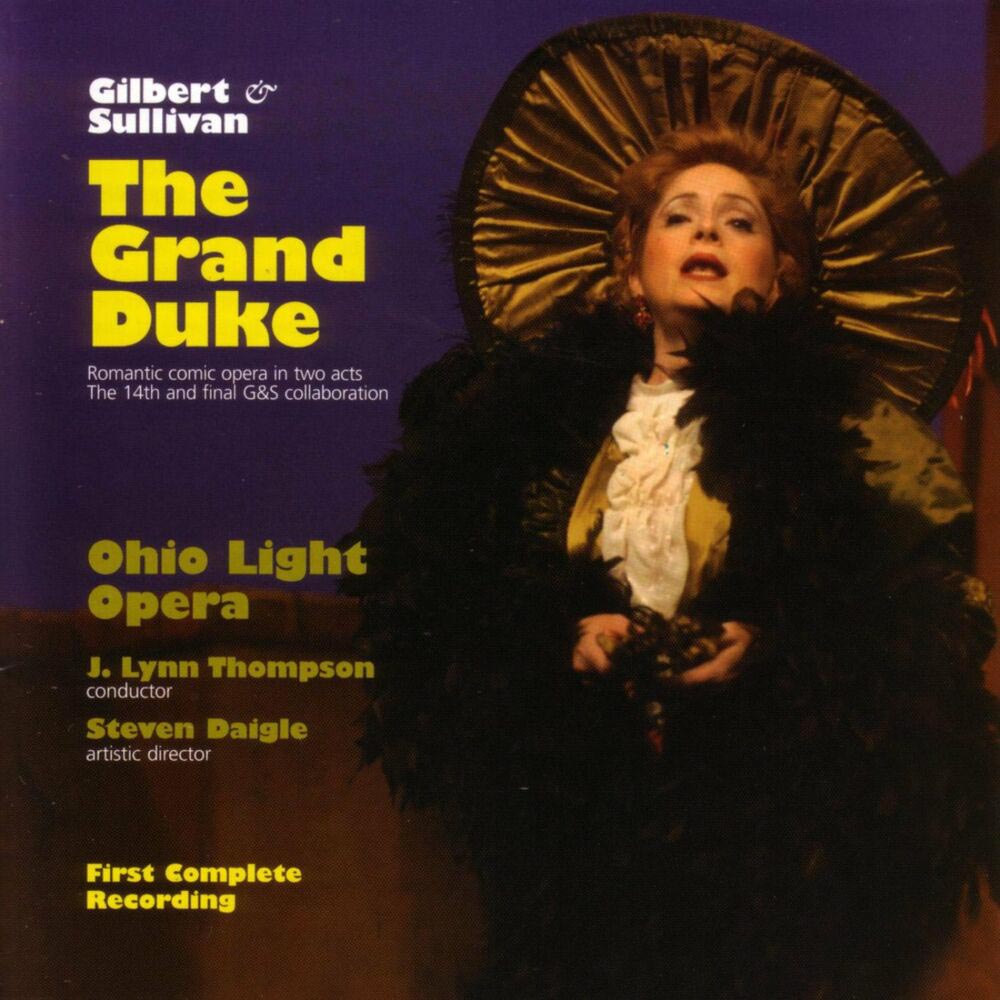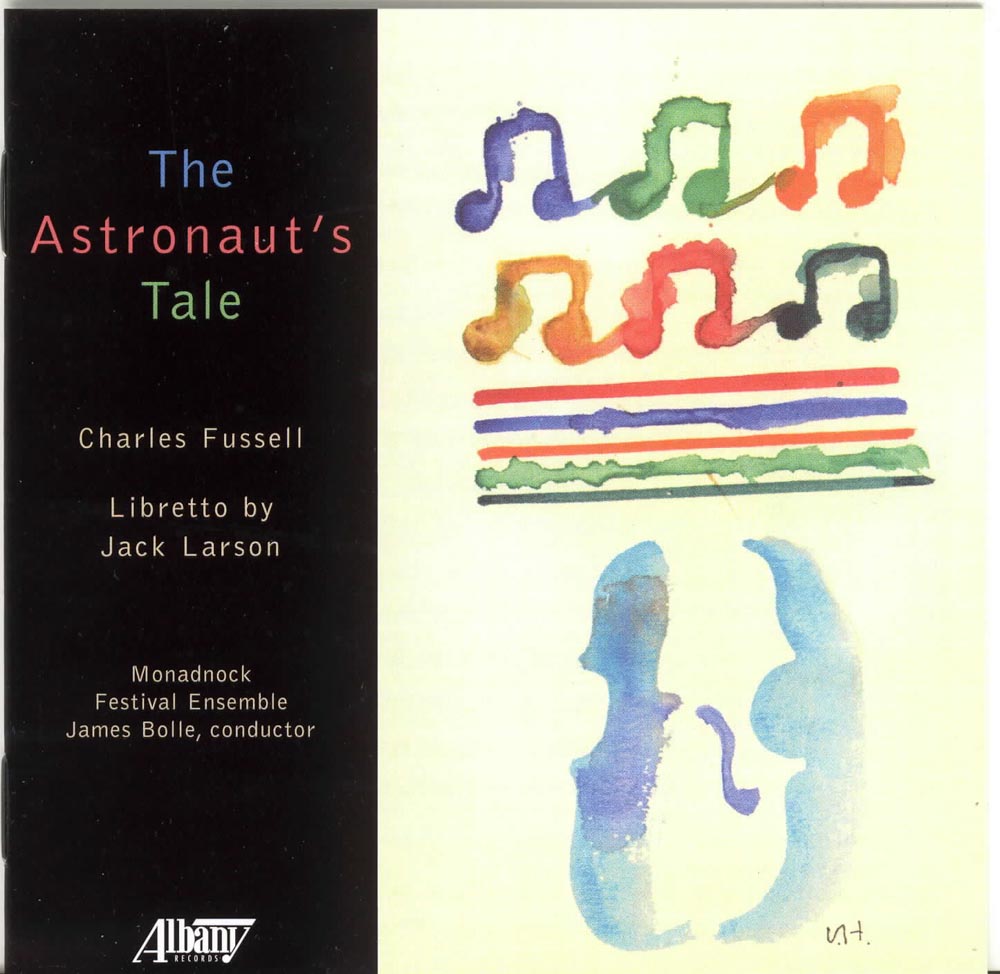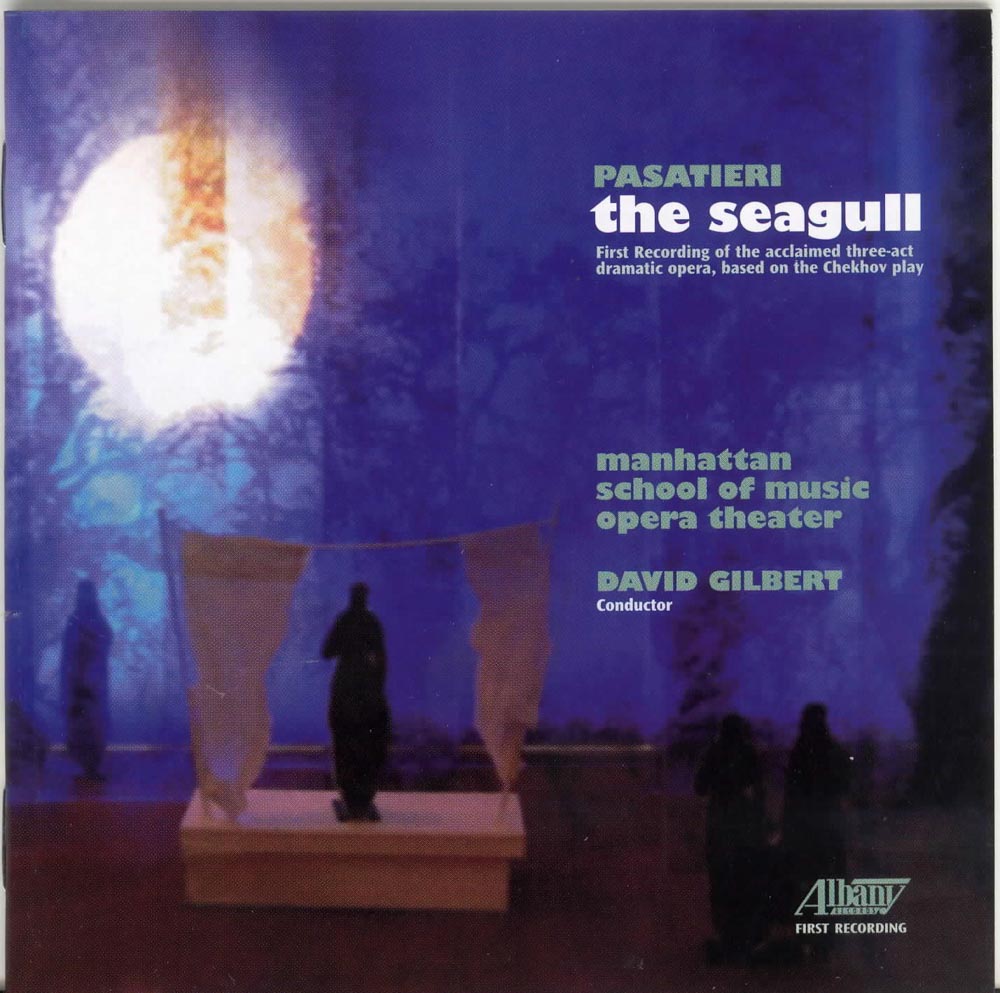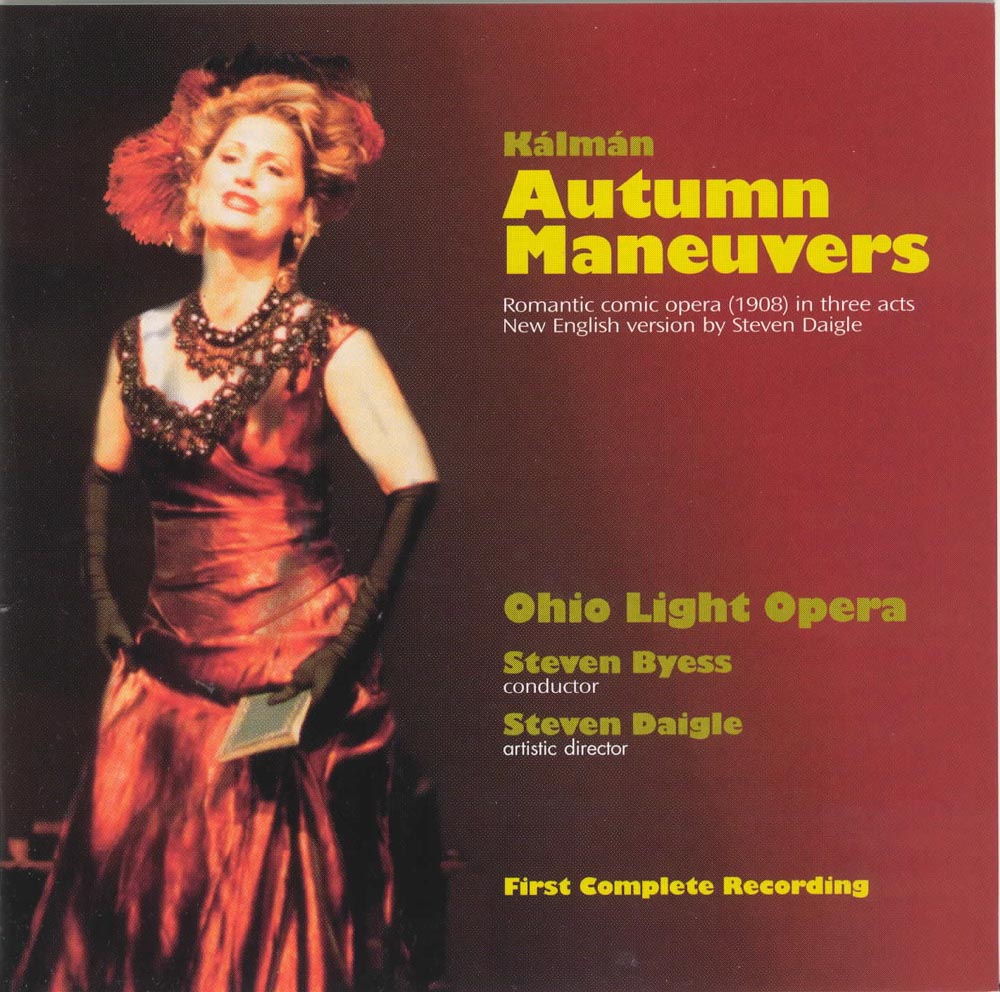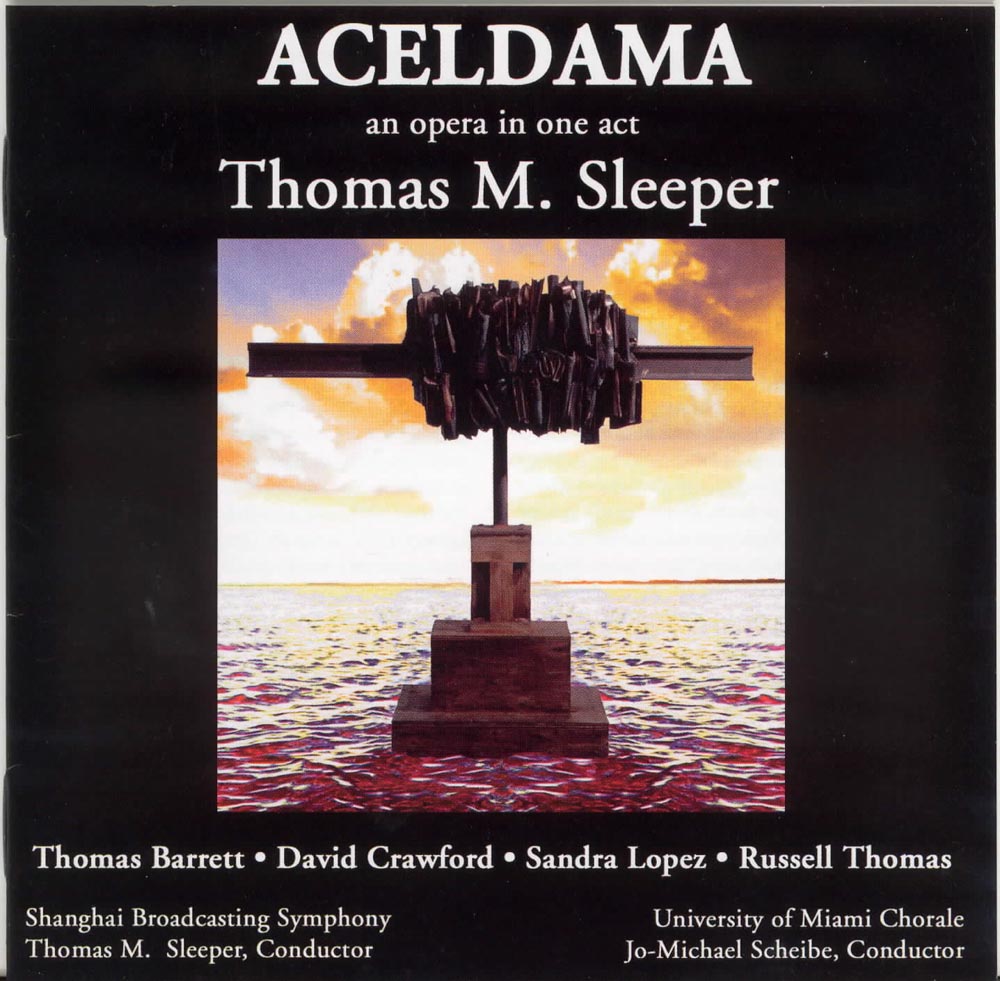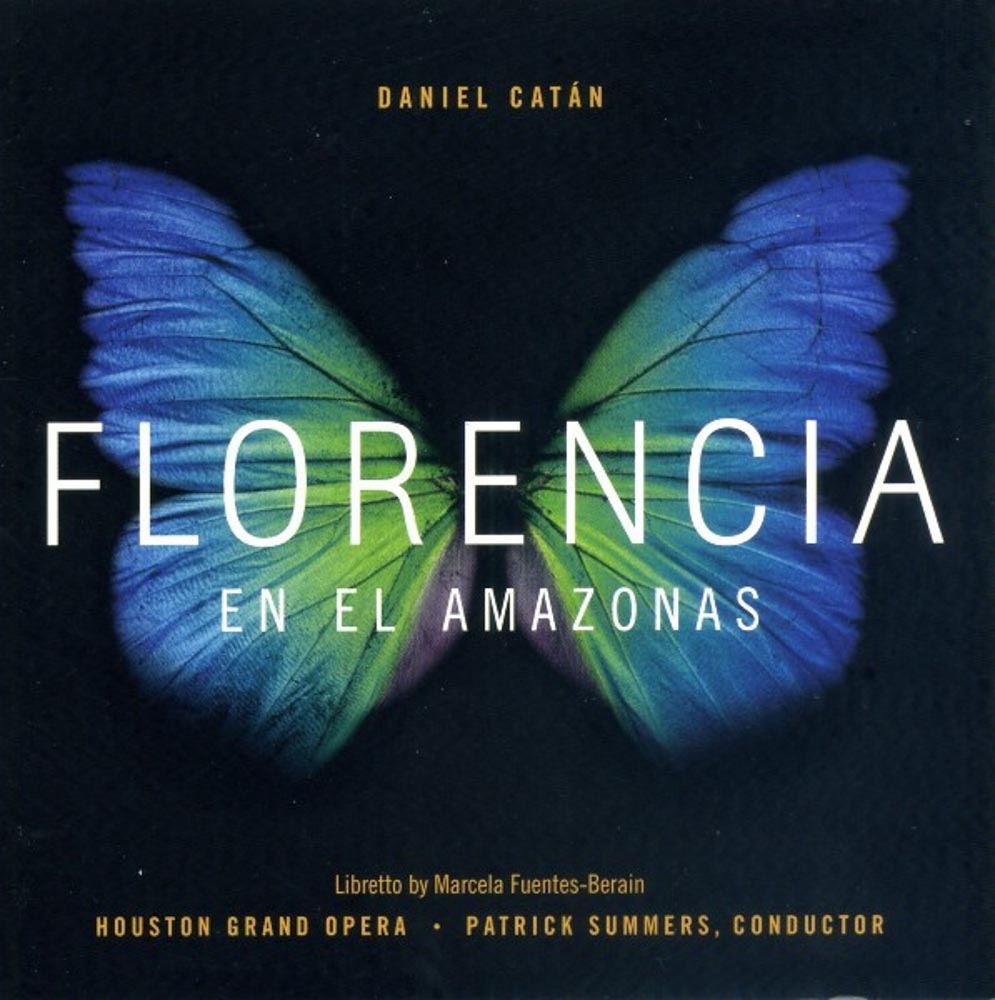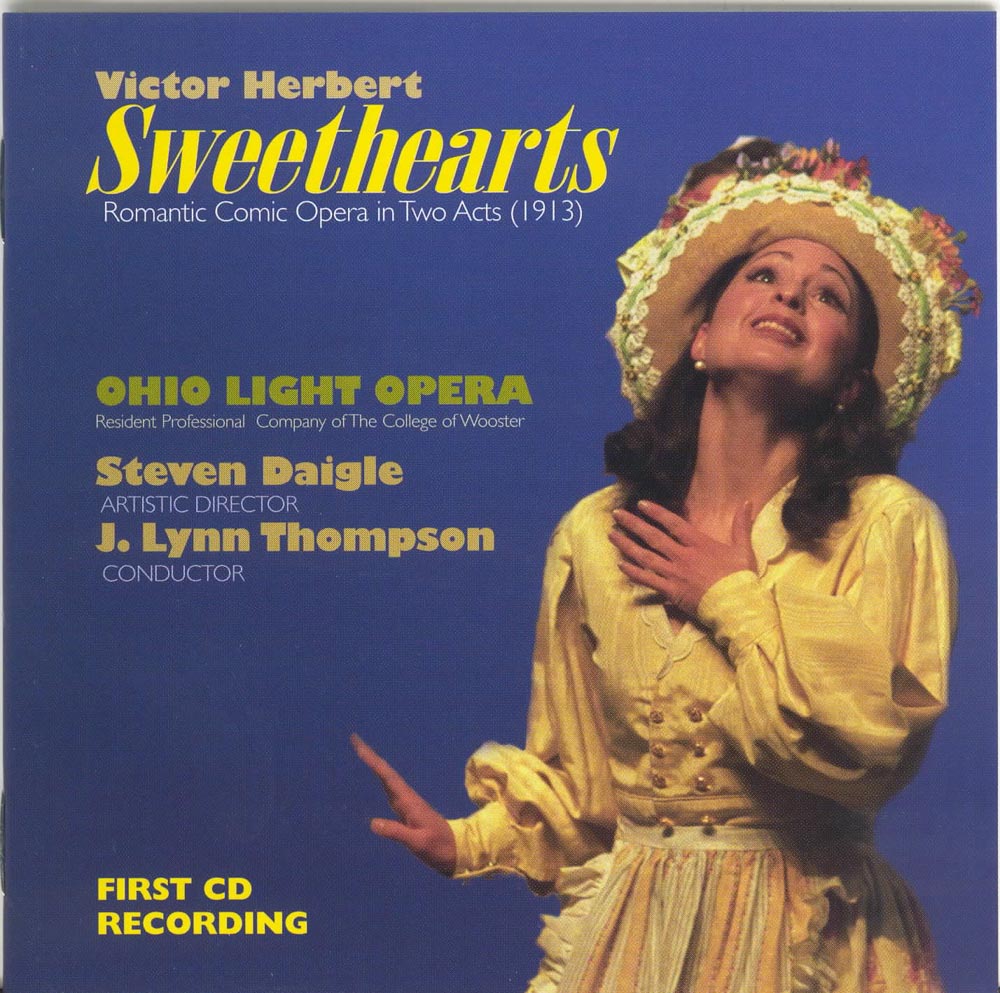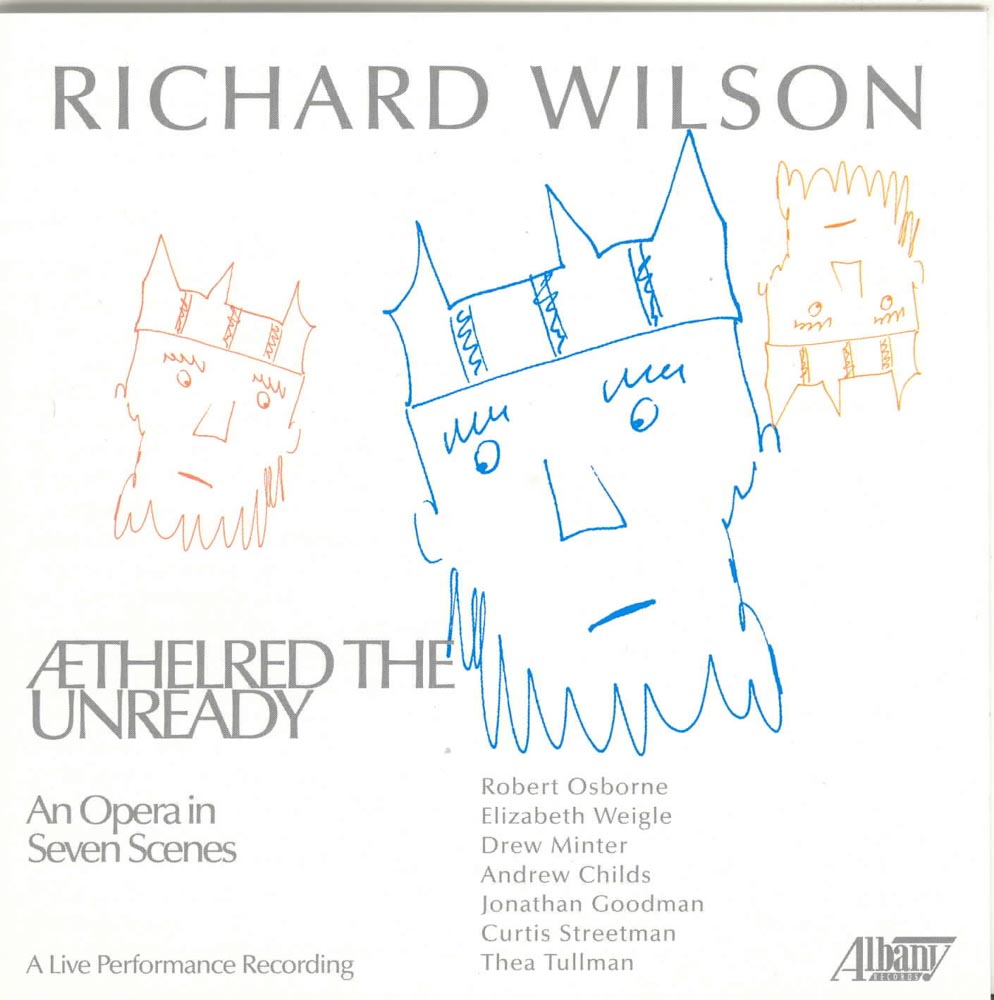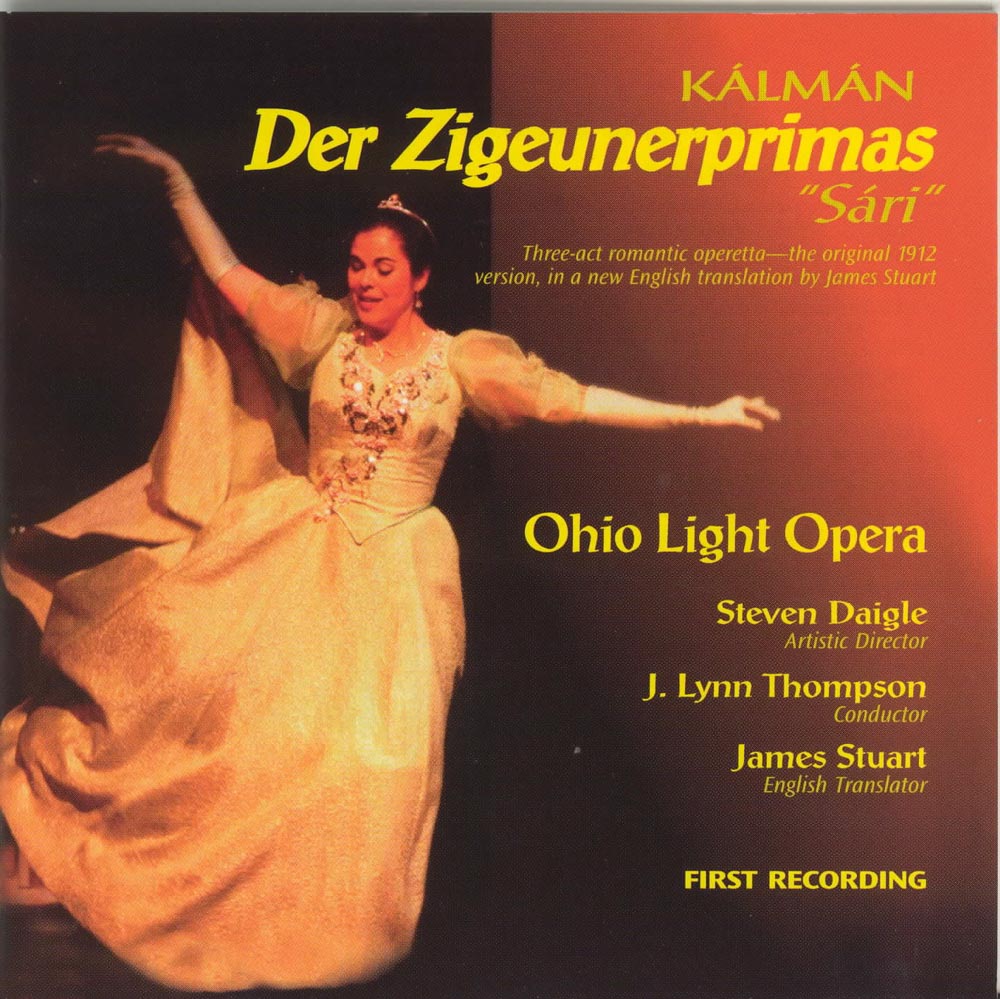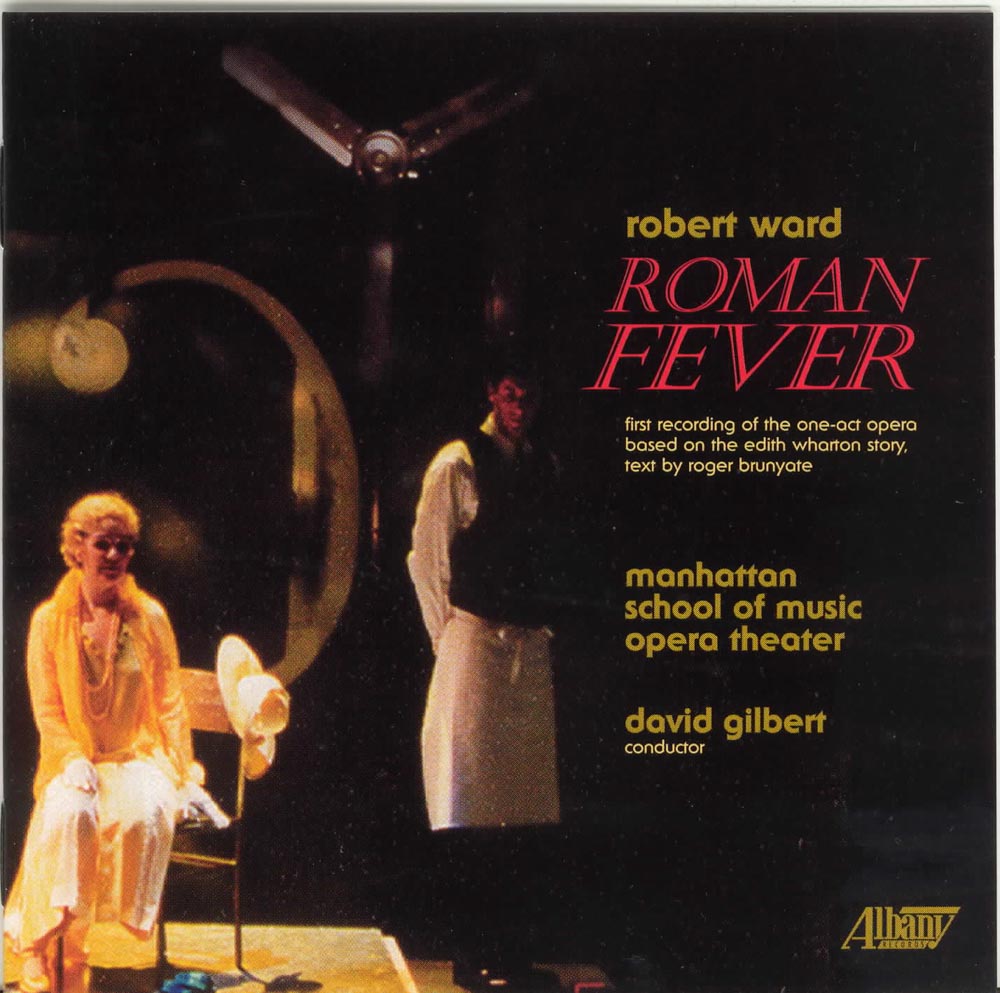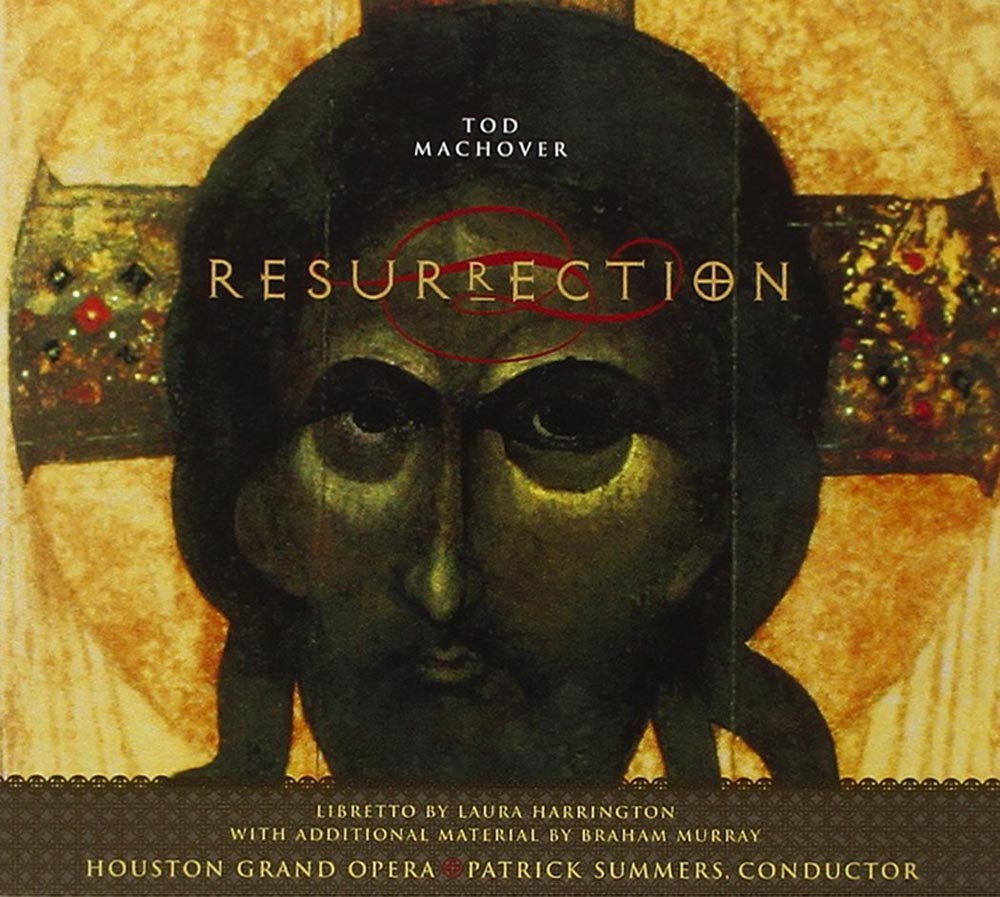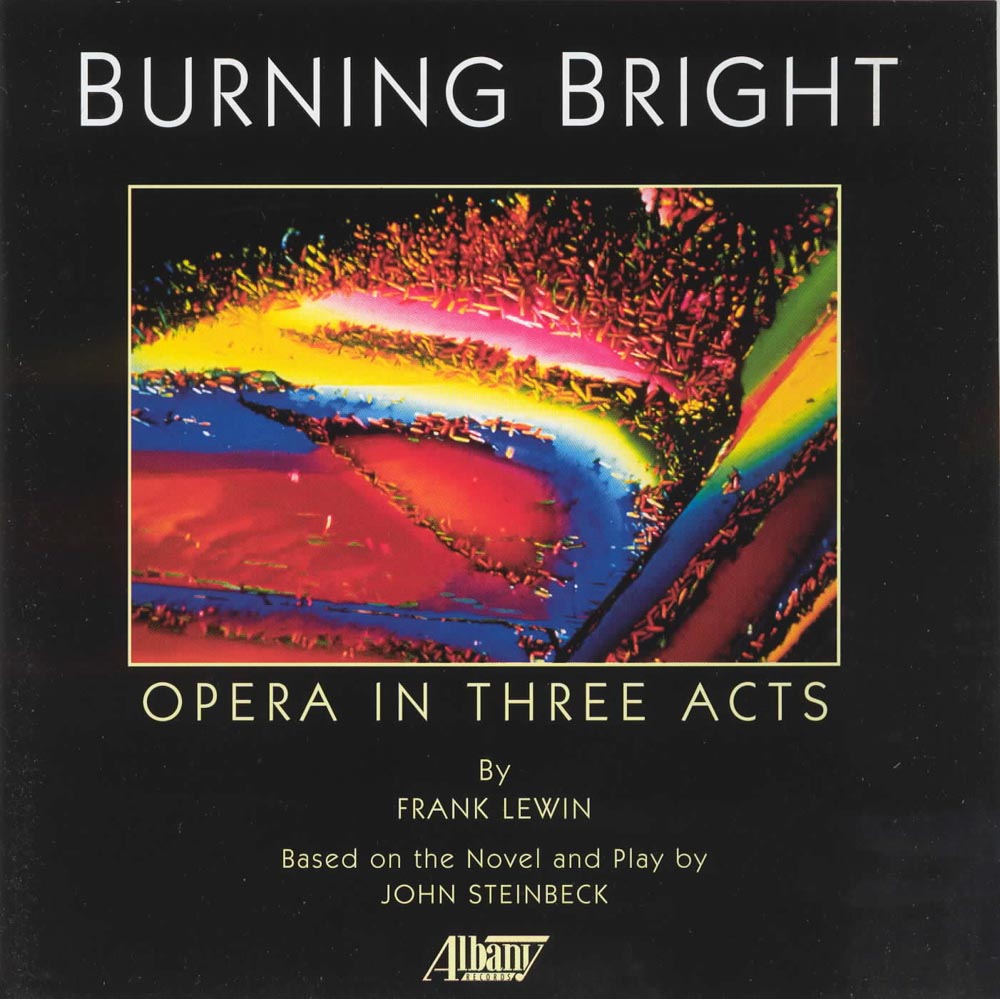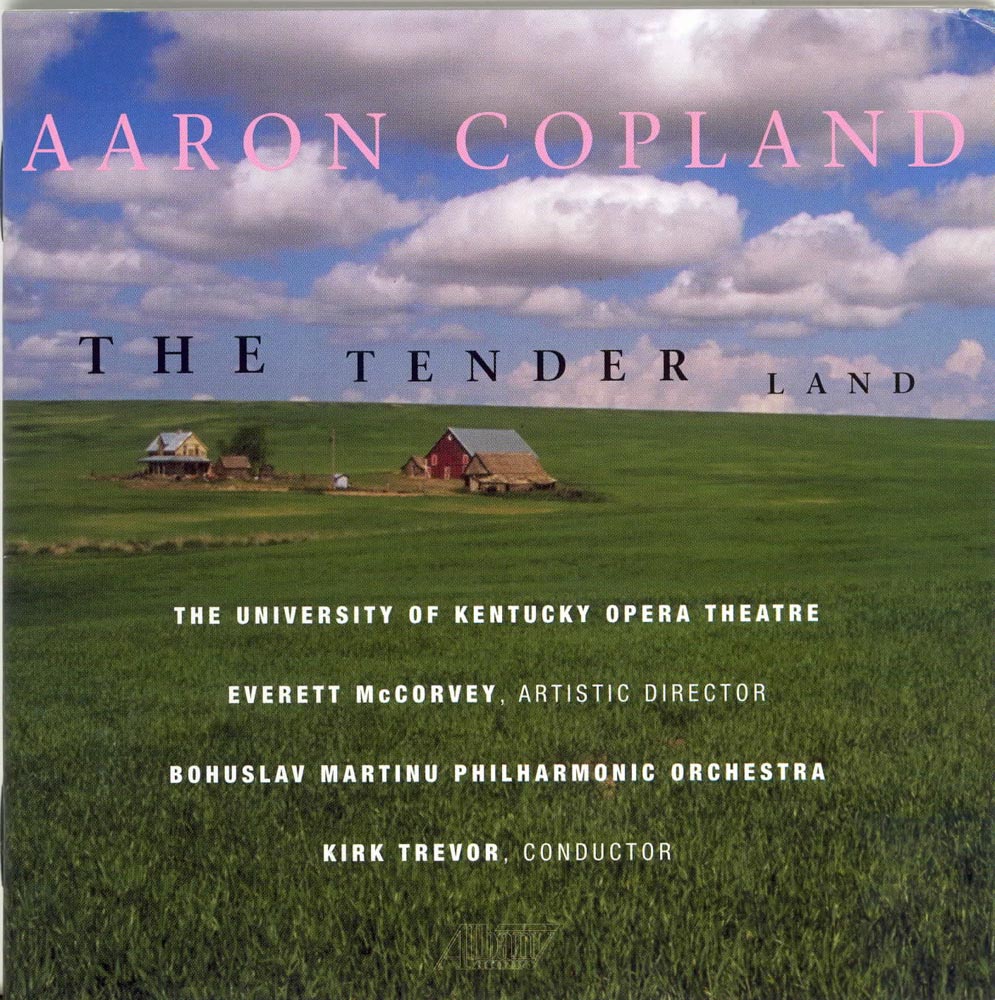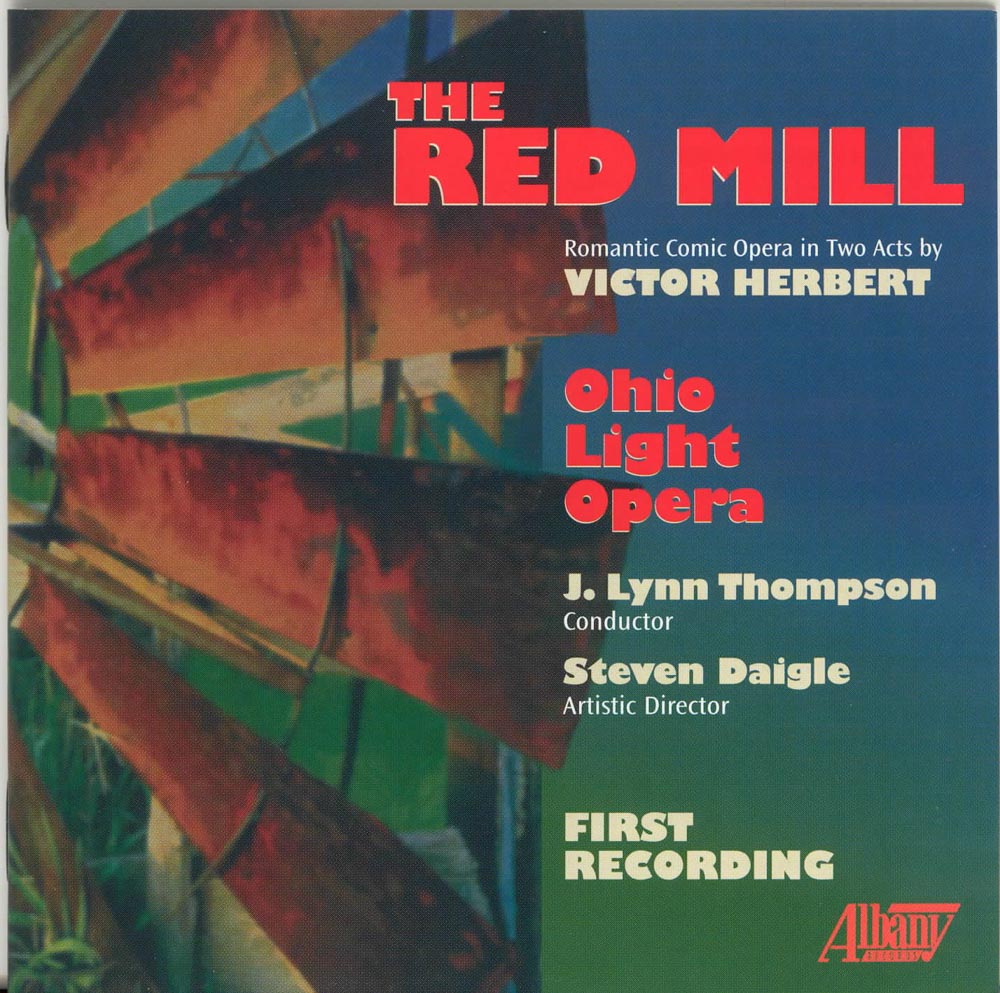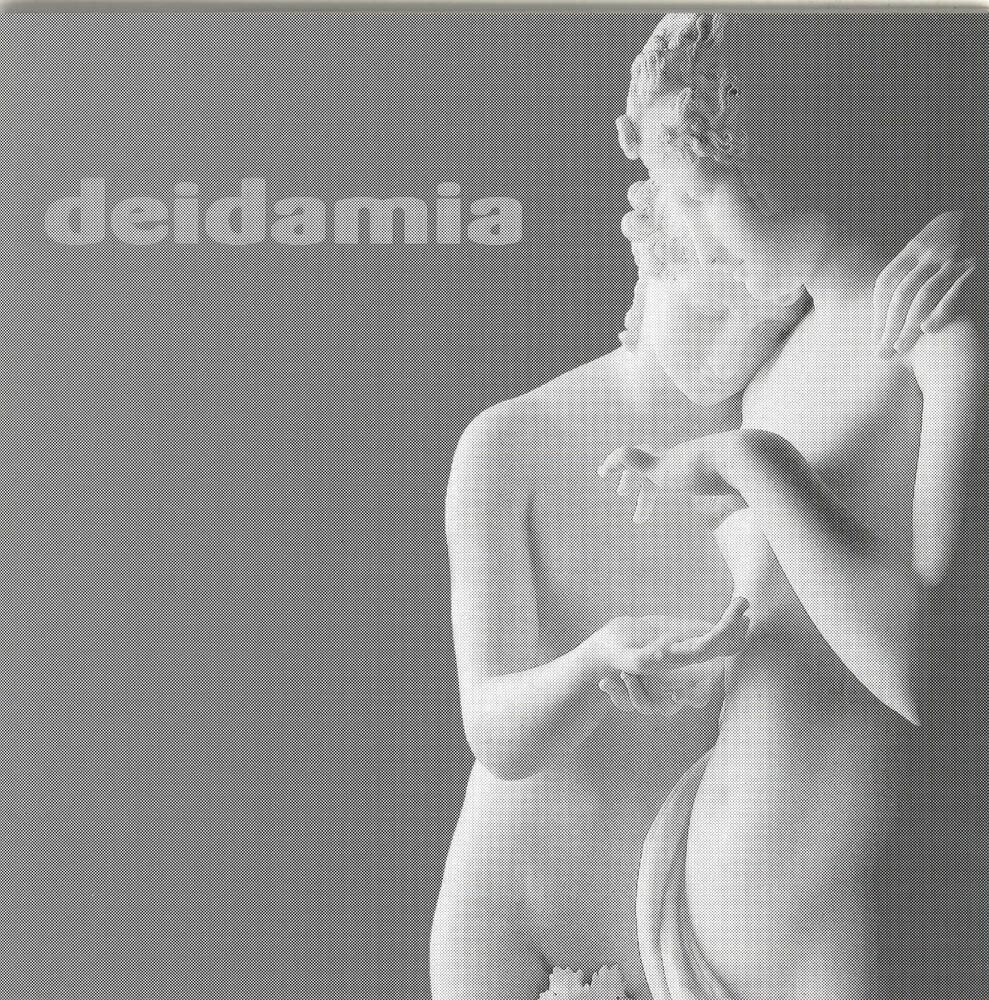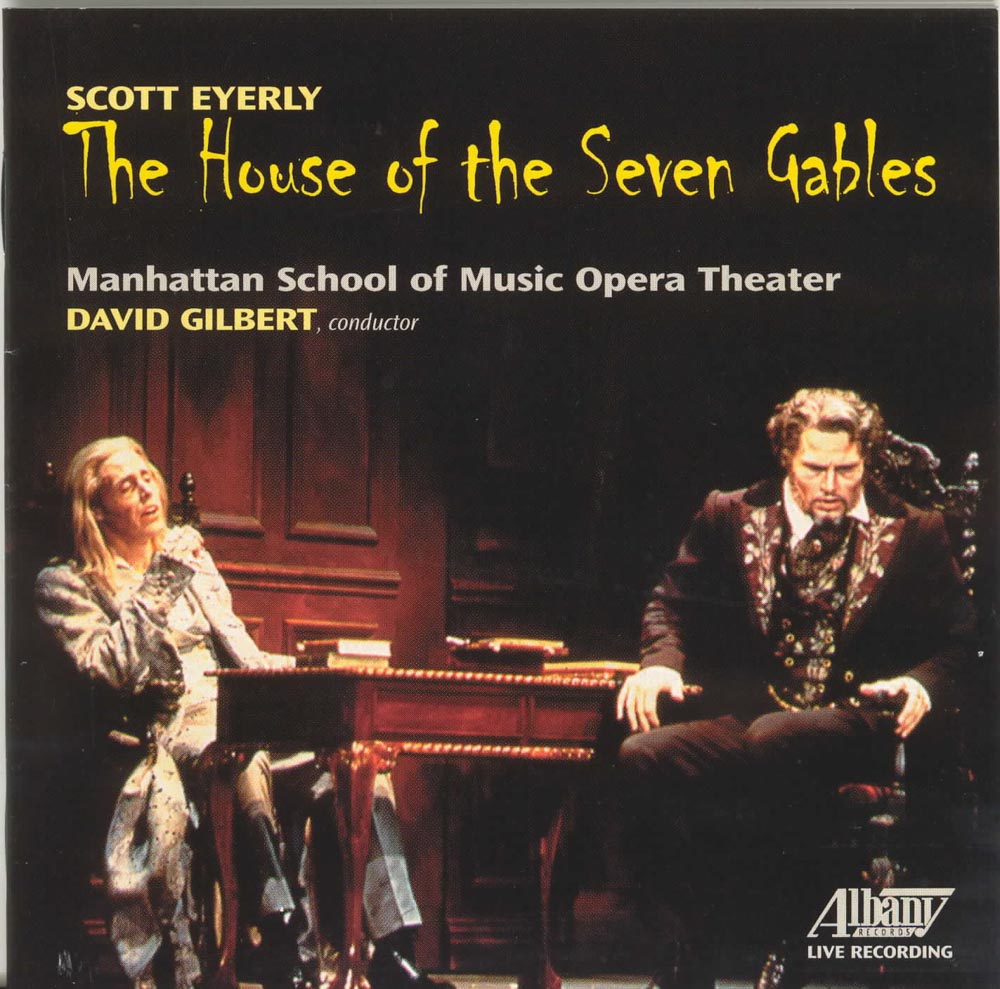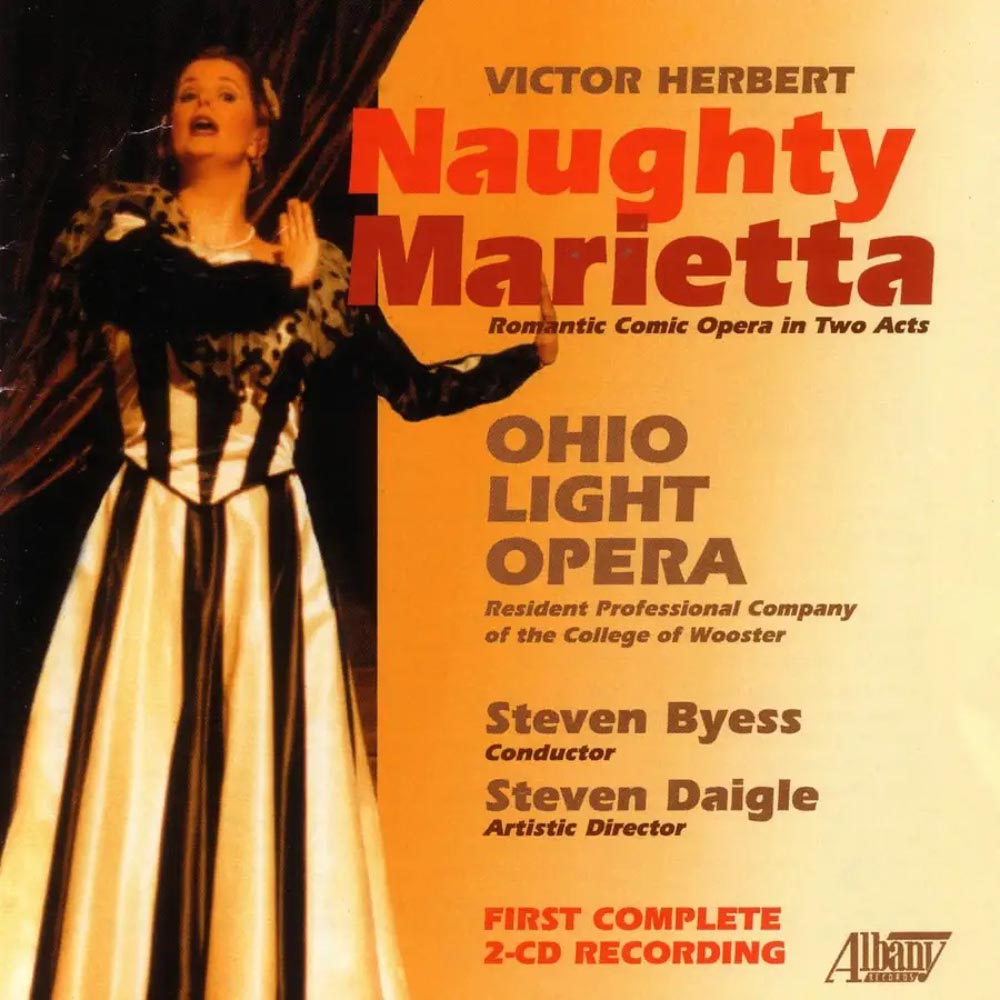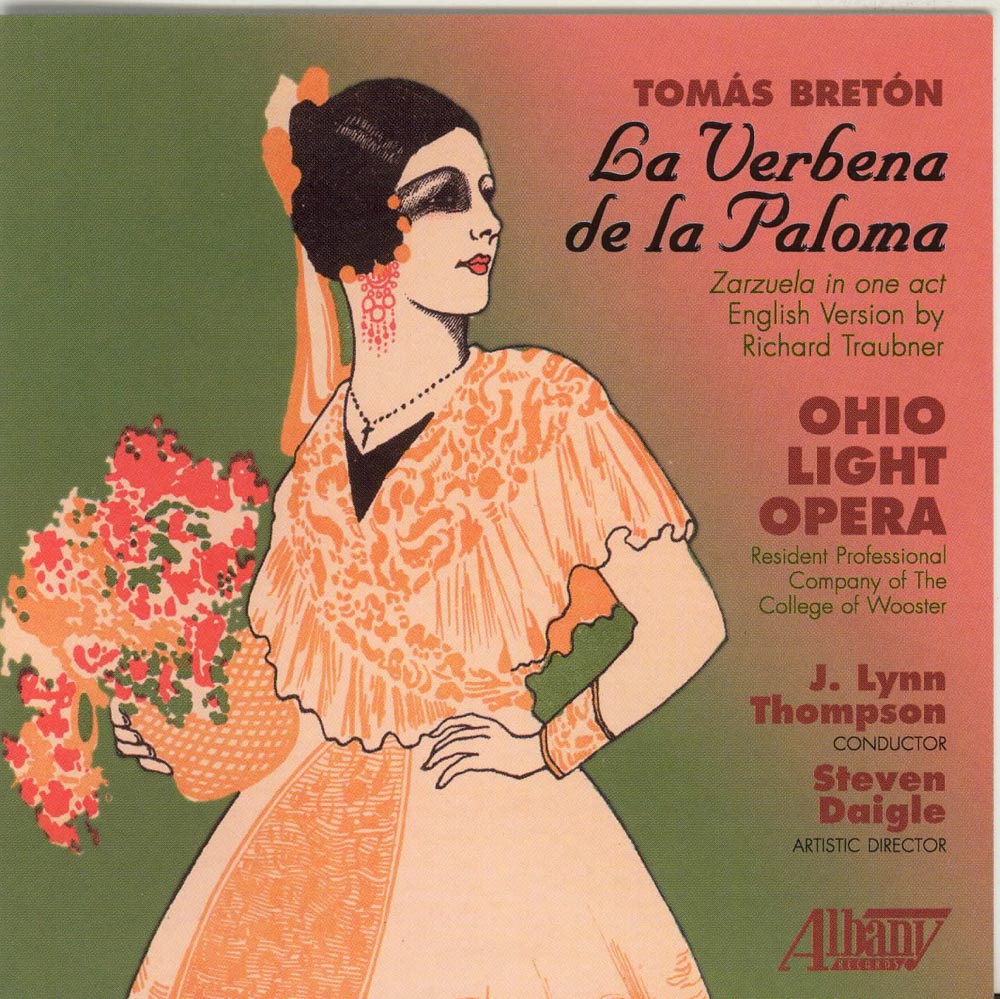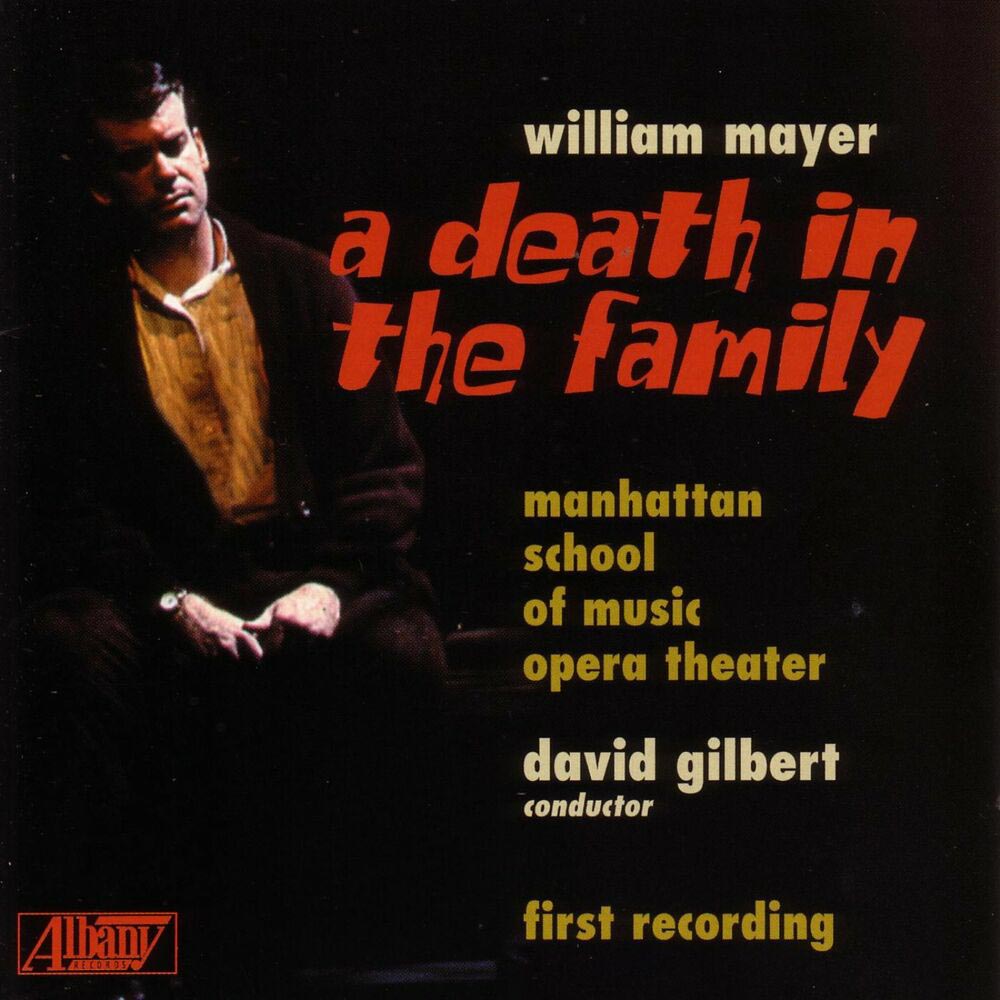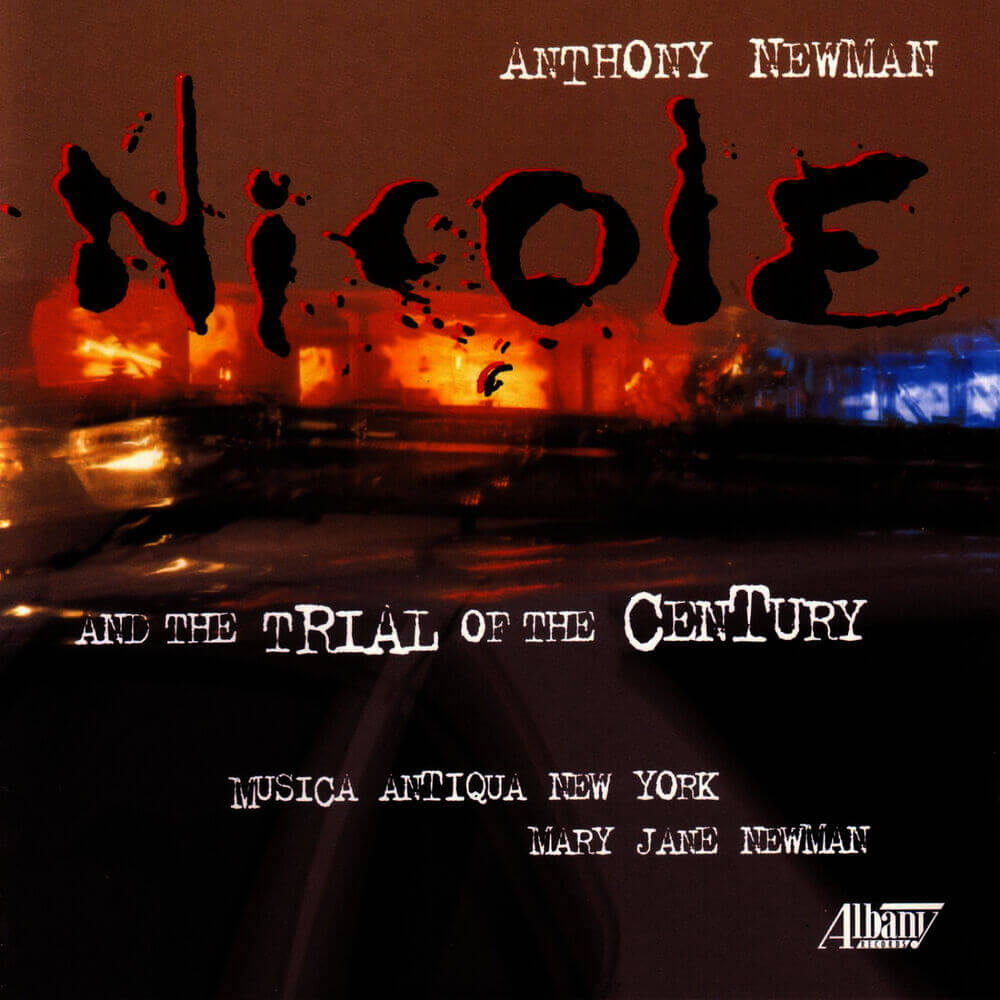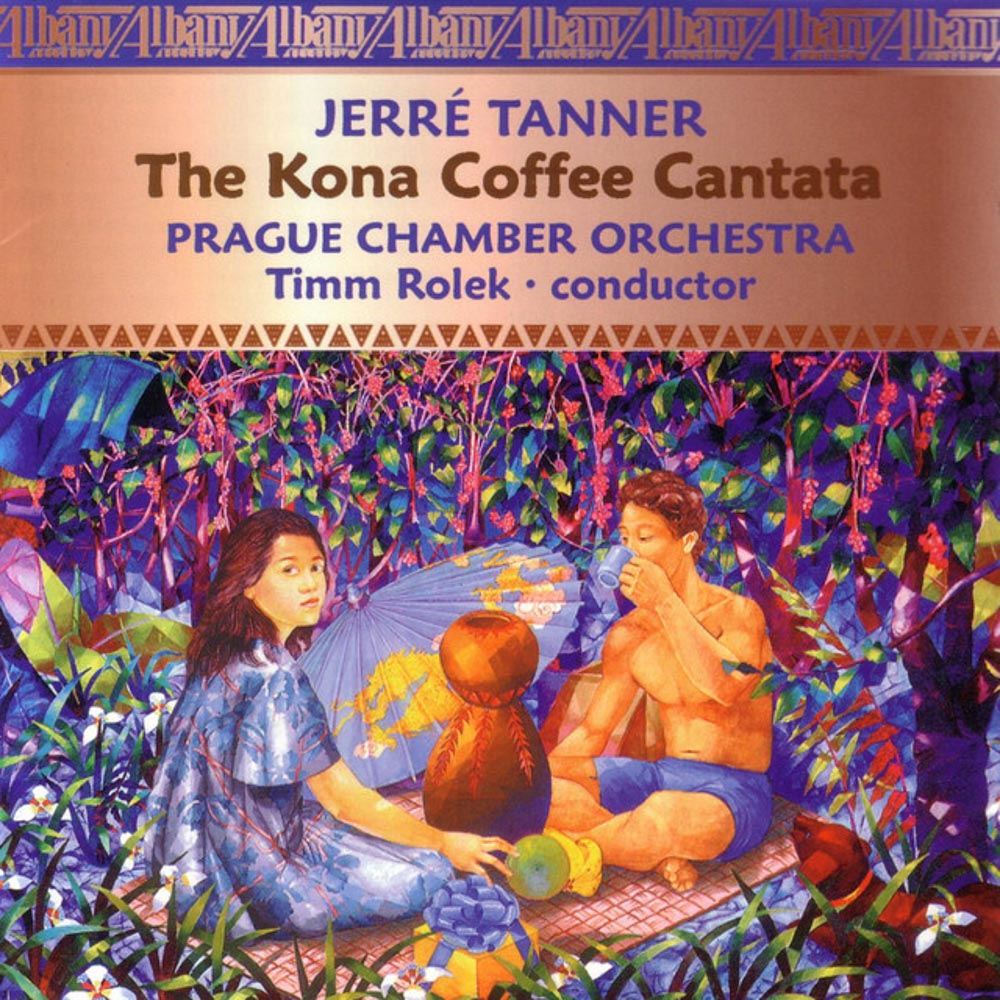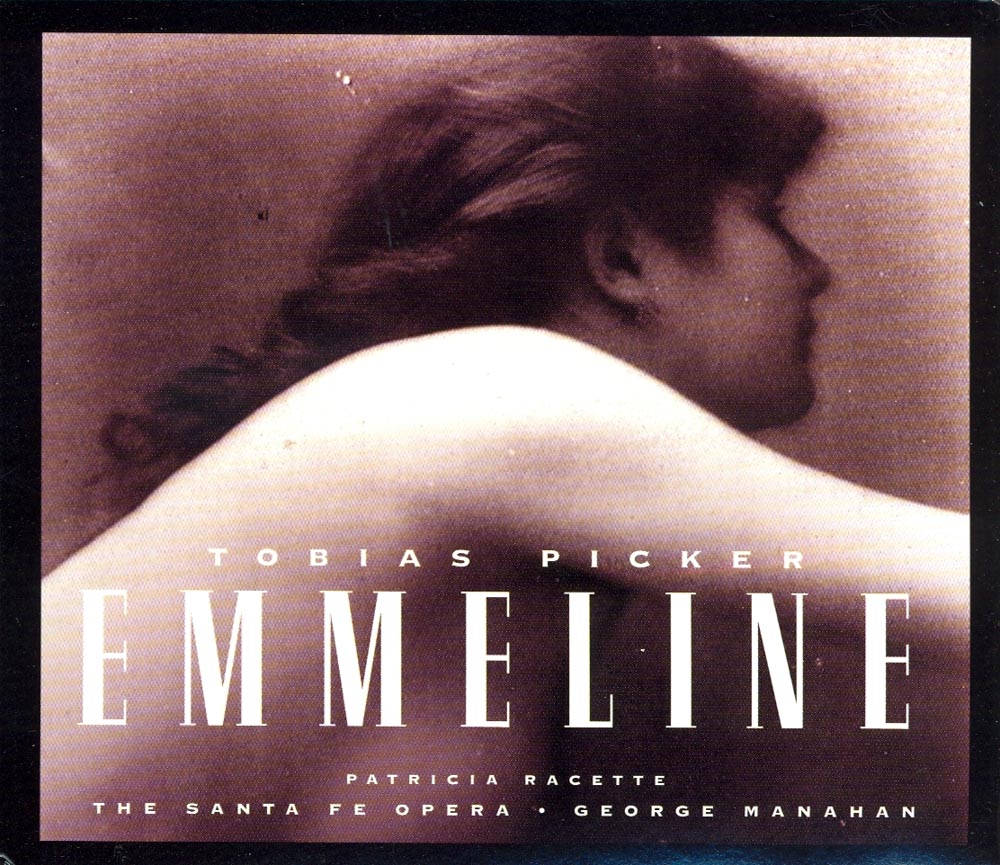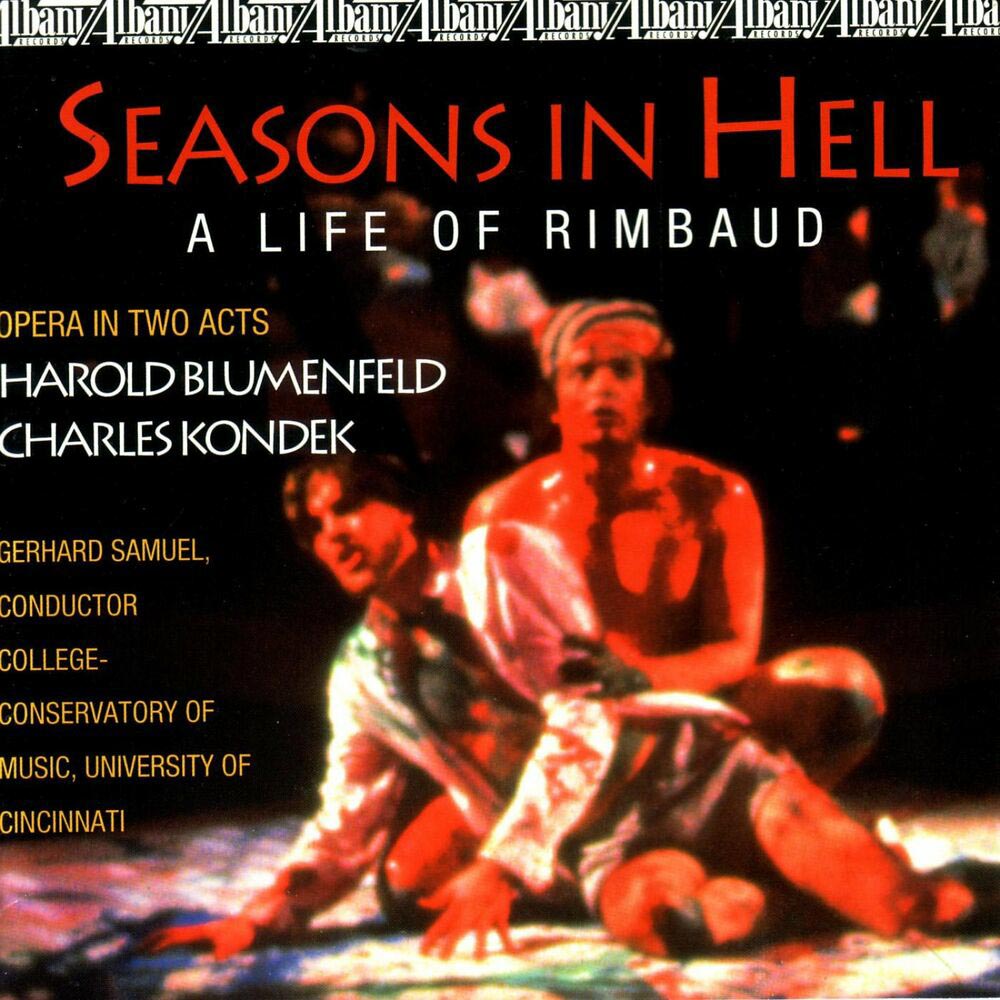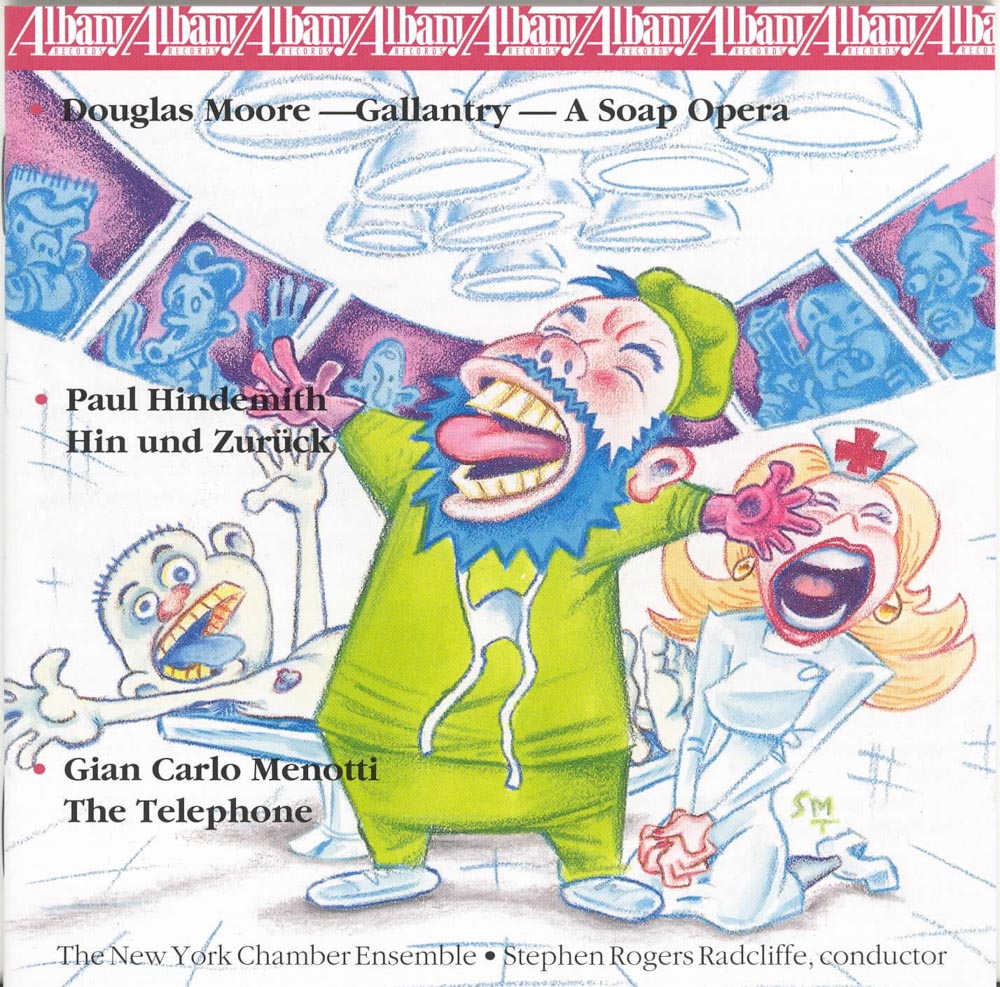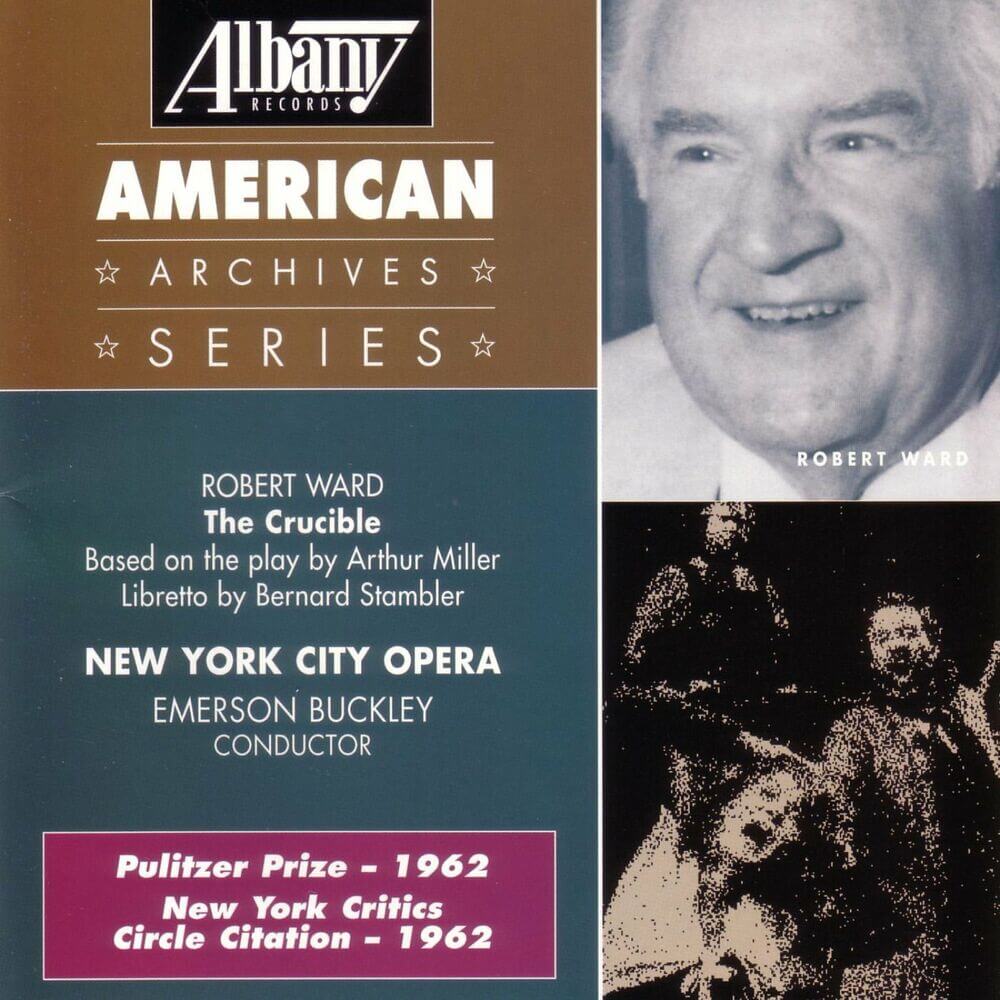Catalog #: TROY0631-32
Release Date: December 1, 2003OperaHere we have the first complete CD recording of the final Gilbert and Sullivan romantic comic operetta written in 1896, set in the imaginary land of Pfennig-Halbpfennig. It was recorded at the Ohio Light Opera Company's 25th anniversary season in 2003. After Utopia Unlimited (1893), Gilbert and Sullivan collaborated -- briefly and unsuccessfully -- with other partners. D'Oyly Carte brought the two together again in 1895, when they began work on what would be their 14th and final light opera. With an unintended symbolism, The Grand Duke brought their joint careers full circle: many of the ingredients of this plot echoed those of their first collaborative efforts of more than twenty years earlier. When The Grand Duke opened at the Savoy Theater on March 7, 1896, the reviews ranged from enthusiastic to disappointed. It ran for 123 performances, not a success by G & S standards, and was never again performed professionally in England until D'Oyly Carte presented a concert version in 1975, with a recording of only Sullivan's music (omitting Gilbert's extensive, but very entertaining, dialogue). After the premiere, Sullivan wrote a friend: "Why reproach me? I didn't write the book...another week's rehearsal with W.S.G. and I should have gone raving mad." Of the work itself, librettist Gilbert complained: "I am not a proud mother, and I never want to see the misshapen little brat again." Their well-documented dysfunctional relationship aside, The Grand Duke contains much hilarious material and charming music. It is great to have it here in its first complete CD recording with all the delightful dialogue included.
Catalog #: TROY0616
Release Date: November 1, 2003OperaComposer Charles Fussell was Artistic Director of New Music Harvest, Boston's first city-wide festival of contemporary music and Co-Founder and Director of the New England Composer's Orchestra. He is currently a member of the Composition faculty at Boston University. The composer writes: "The Astronaut's Tale was mostly written during a generous two month fellowship at Yadoo in Saratoga Springs in June and July of 1996, and was completed the following winter. It is conceived as a numbers-opera; arias, duets, trios, with preludes and interludes, all connected by a narrator. The story traces a young man's life from his first experience of loss, his dog killed by a car, the appearance of a mysterious Einstein-like guide, his youthful desire to become an astronaut, marriage, and the fulfillment of his ambition. The setting is our own time with its confrontation of science and religion. The opera concludes with a meditation on the nature of the cosmos and our experience of life and death within."
Catalog #: TROY0585-86
Release Date: June 1, 2003OperaDas Dreimaderlhaus was an early example, and one of the most successful, of the operetta sub genre called the pasticcio. The Italian word (like operetta itself) literally means something pasted together from existing material, in this case from music by a single composer. Weiner Blut, arranged from existing Johann Strauss II selections in 1899, with the approval of the composer, was another early Viennese pasticcio that still holds the stage over a century later. Das Dreimaderlhaus however, takes the hommage a step further: the libretto deals with the supposed life of the composer himself. The original idea was to transform into an opera the popular romantic 1912 novel Schwannerl (Toadstool) by Rudolph Martsch. Heinrich Berte, an Hungarian-born, Vienna-based composer who had several operettas produced in Vienna and elsewhere without much success, had the notion to dramatize the Schubert story that the novelist Martsch had already embroidered well beyond the actual facts. Berte composed a new score around one original Schubert song used prominently, the "Ungeduld" ("Impatient") Lied. Wilhelm Karczag, then managing the Raimundtheater, was presented with a draft version. He wanted more Schubert and less Berte. The libretto was then modified to incorporate a selection of suitable all-Schubert songs and orchestral pieces, rearranged for theatrical use by a reluctant, but skillful Berte. The music Berte chose may have been somewhat familiar, but not entirely so. For every familiar number, there were reworkings of then-comparatively obscure themes from Schubert's piano or chamber works, or his Rosamunde incidental music. The libretto that accommodated these enchanting pieces may have stretched the historical facts, but it managed to incorporate a considerable number of real people alongside the composer to give some appearance of historical reality. The first night, January 15, 1916, was a triumph; this proved exactly the show the Viennese wanted to escape to in the wartime period. Not only could the Vienna public hear their beloved Schubert, they could see him in a quaint courtyard, a dainty salon, or a Hierzing square, all in the cozy Biedermeier era.
Catalog #: TROY0579-80
Release Date: April 1, 2003Opera"Over 28 years have passed since the premiere of The Seagull, half a lifetime for me. Of my 17 operas, it remains my favorite child. The musical atmosphere has changed greatly in the interim and the lyric, romantically tonal is no longer the exception, but now the standard. Critics are no longer shocked by a flow of melody from composers, and the love of audiences for a new work is no longer suspect. For this production, I have written two new interludes to accompany the act divisions and stagecraft. As I wrote them, I was flooded with the feelings of my 26 year old self and so grateful that this opera has survived and is still being produced. It has been twenty years since I have written an opera and I have in all that time refused to do so. But now, my heart and mind have changed and as I poured over the score for this New York production, and in preparation for next season's in San Francisco, I begin to hear faintly in the back of my mind... music...operatic music. Perhaps soon, there might be number 18."
Catalog #: TROY0562-63
Release Date: January 1, 2003OperaThe Ohio Light Opera production of Autumn Maneuvers in the summer of 2002, was the first time the work was produced in its entirety in the United States. In 1912, the Viennese music critic Richard Specht wrote of the premiere of Kalman's opera Der Zigeunerprimas: "Kalman's music is fresh and pleasant, full of strength in its natural melodic invention and of wholesome maturity. While others grope and experiment, he stands in the rich soil of folk music and hits the mark every time." Autumn Maneuvers was written three years before Der Zigeunerprimas, but was already rich in folk elements, specifically those of Kalman's native Hungary. These are not the same fundamental folk elements used collected by Bartok and Kodaly with whom he was a fellow student at the Budapest Academy of Music. Rather, the melodic materials used by Kalman are polished and elegant, similar to those of another fellow Hungarian Franz Liszt. Kalman also shows his great skills as an orchestrator in Autumn Maneuvers. Similarities to Tchaikovsky, who was a model for the composer, abound in the score. It is clear that the 26 year-old Kalman had found a formula for success in the excellence of Autumn Maneuvers Ð essentially his first major work for the stage. This is Autumn Maneuvers' first complete CD recording.
Catalog #: TROY0541
Release Date: January 1, 2003Opera"...his music is tonal and melodic yet Sleeper avoids high sucrose neo-Romanticism for a darker, more personal and edgy style, bristling with nervous energy," writes the music critic Larry Johnson. Thomas M. Sleeper currently resides in Miami, Florida, where he is Director of Orchestral Activities and Conductor of the University of Miami Orchestra and Opera Theater. "Aceldama," Greek for "field of blood," appears in reference to the field where Cain slew Abel in the first recorded homicide (in fact, fratricide) of the Judeo-Christian tradition. "Aceldama" is sometimes also used to describe the field where Judas committed suicide after his betrayal of Christ. The opera Aceldama is based on the story of Cain and Abel and takes this tragedy through the ages to the Nazi Germany death camps and beyond. Three parts are joined to form one act. Part I takes place in the 1940s, with the final scene projecting surrealistically into the present and the future. Elements are fused from accounts of the Holocaust, Jewish and Christian texts, the Upanishads, the Arthurian legend, Dante's Inferno, and the Faust legend among other sources.
Catalog #: TROY0531-32
Release Date: December 24, 2002Opera"My journey down the Amazon, the real and operatic one, began in the studio of my dear friend Alvaro Mutis. He knows the jungle intimately and has written about it all his life; at the same time he is a great lover of opera. The combination could not be better. We met many times in his studio. Prints of magnificent riverboats occupy the spaces normally reserved for family photographs. It was there that I learned about the dangers of river navigation, and also about the psychological states the Amazon induces in its travelers; the way it conjures up their most secret desires and deepest fears. In the opera, Florencia undertakes a journey that will bring her back to her origins. It is, I believe, the story of the return journey that we all undertake at a certain point in our lives: the moment when we look back at what we once dreamed of becoming, and then confront what we have now become. As Florencia sings her final aria, her voice, her song and she herself, become intertwined with the image of a butterfly. She breaks through her cocoon; her voice soars, her song acquires transparent wings. Love and beauty become indistinguishable from each other. The image of the butterfly, supremely beautiful from the moment of its birth, is overtly present at the end of Florencia. But it is an image that has been present in my mind as I composed several of my works. I have asked myself why. I think it is my way of understanding the moment when something is no more, my way of transforming it, like when I finish an opera, and say good-bye to characters that have lived with me for so long and have taught me so much, that grew out of me so I could be born out of them, that are, in the end, indistinguishable from myself." Daniel Catàn now lives in Los Angeles and is working on a new commissioned opera for Houston Grand Opera
Catalog #: TROY0546-47
Release Date: October 1, 2002OperaVictor Herbert conducted the first performance of his delightful two-act operetta Sweethearts in Baltimore, after which the show was overhauled and shortened before spending five weeks in Philadelphia and another five in Boston. Anticipation of the New York premiere of the work (on September 8, 1913 at the New Amsterdam Theater) was heightened by advertisements proclaiming that Christine MacDonald (whose name was printed in larger type than Herbert's) would be the star.
Catalog #: TROY0512
Release Date: June 1, 2002OperaRichard Wilson is the composer of some eighty works in many genres. A Phi Beta Kappa graduate of Harvard, he holds the Mary Conover Mellon Chair in Music at Vassar; he is also Composer-in-Residence with the American Symphony Orchestra. Richard Wilson writes: "It was during a prolonged losing streak of the New York Yankees (we New Yorkers love our Yankees) that, musing on the subject of failure, I decided to write an opera about _thelred the Unready. The libretto I wrote is mainly whimsical. But, it does draw on history, presenting three characters who actually existed. Work on the libretto and then the music of the opera began in the summer of 1992. Excerpts were performed in concert by The American Symphony Chamber Orchestra in 1993 and 1994. The first complete performance is the one captured here." So here we have the first opera ever, inspired by a losing streak of the New York Yankees, or any baseball team as a matter of fact.
Catalog #: TROY0510
Release Date: April 1, 2002OperaJames Stuart, who prepared the new English version of the libretto for this operetta writes: "after the success of the Ohio Light Opera's production of The Bayadere in 1998, Yvonne Kàlmàn, the composer's daughter, and I talked of the possibility of resurrecting Kaiserin Josephine, her father's last work before emigrating to America in 1936 and one that had never been performed in the United States. I was excited about the venture. What beautiful music it was: I certainly could understand Yvonne's desire to have it produced. But when the vocal score and libretto arrived, I had second thoughts about the feasibility of staging so elaborate a work. Nevertheless, I was determined to have a Kalman operetta revival, but which work? When I turned to Der Zigeunerprimas, which one might translate as "The Gypsy Virtuoso," I became committed to it: voluptuously sweeping melodies, lively gypsy tunes, languid waltzes, comic songs and dances - all masterfully orchestrated. I began to translate the German libretto and at the same time to sketch out staging notes. Thus resulted the wonderful production which we presented at our 2001 summer festival and have here recorded for your enjoyment."
Catalog #: TROY0505
Release Date: March 1, 2002OperaRoman Fever had its world premiere in Durham, NC in the Spring of 1993. Robert Ward, Pulitzer-prize composer and retired Mary Duke Biddle Professor at Duke University, composed the music for the opera based on the well-known short story by Edith Wharton. The librettist, Roger Brunyate, is a stage director for the opera department at the Peabody Conservatory in Baltimore. "Earlier," said Ward in an interview, "Roger told me he was speaking to all his composer friends about writing operas with predominantly female casts. His idea seemed a good one, since most university and conservatory opera groups are three-quarters women and one-quarter men, and opera casts are usually the opposite - mostly men, fewer women." Shortly after this, Ward happened to read Wharton's short stories, including "Roman Fever." "I thought, My God, what a story, so I contacted Roger to see if he'd like to write the libretto while I worked on the music." The title refers both to malaria, the disease which once flourished in the marshes near Rome, and, metaphorically, to the giddiness that strikes many who visit the romantic Italian capital. Despite dark elements, the composer describes his work as a "tragicomedy: no one dies. "The tragic element," says Ward, "lies in the thing that in our life we have failed to achieve: relationships, career, the thing that leaves a kind of ache inside throughout our lives." The score of the opera displays a number of interesting musical styles: the old-style Italian ballad, a jazz duet, an operatic aria and a soaring quartet where each woman expresses her individual thoughts. Said Ward, "I've never written anything so overtly jazzy as this duet in this show 'They Kissed our Hands'."
Catalog #: TROY0495-96
Release Date: February 26, 2002OperaHere Albany Records is privileged to present the world premiere recording of this wonderful new opera by the American composer Tod Machover who was recently called brilliantly gifted by The New York Times and “America’s most wired composer” by the Los Angeles Times. He is highly regarded for music that boldly breaks traditional artistic and cultural boundaries, offering a unique and innovative synthesis of acoustic and electronic sound, of symphony orchestras and interactive computers, of operatic arias and rock songs, and that consistently delivers serious and powerful messages in an accessible and immediate way. As Pulitzer Prize-winning music critic Lloyd Schwartz has written: “What’s most exciting about Machover’s pieces in general is how beautiful and moving they are, what lyrical and exotic melismas keep surfacing (and how scintillatingly they contrast with the shattering electronic textures), how dramatically they build, how they haven’t a dull moment, and what magnificent opportunities for performers they provide.” Machover has composed five operas in quite diverse forms, from the science fiction VALIS, commissioned for the tenth anniversary of Paris’ Centre Pompidou, to the walk-through Meteorite, permanently installed in Essen, Germany since 1998. His celebrated audience-interactive Brain Opera was the hit of the 1996 Lincoln Center Festival, and is now permanently installed at the House of Music in Vienna. Resurrection received a new production at Boston Lyric Opera in 2001/2002. Machover is also noted for inventing new technology for music, especially his Hyperinstruments that use smart computers to augment musical expression and creativity for virtuosi, amateurs and children. The latest application of Machover’s hyperinstruments is for the creation of Music Toys that will enable children to collaborate creatively with orchestras around the world in his Toy Symphony project, which premieres in Europe in Spring 2002 before traveling to the United States and Asia. Machover is currently working on new operas for the Opera of Monte-Carlo and New York City Opera. He was formerly Director of Musical Research at Pierre Boulez’s IRCAM Institute in Paris. He received his degrees in musical composition from The Juilliard School, where he studied with Elliott Carter and Roger Sessions. Currently, Machover is Professor of Music and Media at the MIT Media Laboratory, head of the Lab’s Opera of the Future group, and Director of its new Centre for Future Arts. He is also a Founding Member of MediaLabEurope in Dublin.
Catalog #: TROY0469-71
Release Date: February 1, 2002OperaFrank Lewin was born in Breslau, Germany, but came to the United States in 1940. He studied composition with among others Hans David and Roy Harris before attending Yale University where his teachers were Richard Donovan and Paul Hindemith. The composer himself was on the faculty of the Yale School of Music from 1971 to 1992, teaching composition for film. During this period he also taught the course Music in Modern Media at the Columbia University School of the Arts. He has been active as an editor and engineer of recorded music. In October 1950, Frank Lewin - then a composition student at Yale - saw John Steinbeck's play Burning Bright in New Haven's Schubert Theater. The play was on its way to Broadway, where it found little favor. Lewin, however, was deeply impressed by the story. It seemed ideally suited for an opera. He never forgot Burning Bright. In 1967, he took out an option to turn the play into an opera. During the next ten years, Lewin did research for the opera and worked on a libretto. In 1977, he began composing the music; he completed the score in January 1989. The opera had its premiere in Woolsey Hall in November, 1993 and was warmly received by audiences and critics alike. In July 2000, the Opera Festival of New Jersey presented two performances in Princeton's McCarter Theater. Once again this wonderful opera was well received.
Catalog #: TROY0482-83
Release Date: January 1, 2002OperaBy the early 1950s, Aaron Copland had become a skilled composer of dramatic music for the stage and screen, with five ballets and seven film scores to his credit. In fact, Copland judged his film work to have been "excellent preparation for operatic writing. At the time I was composing for films, I believed that it was a new form of dramatic music, related to opera, ballet and theatre music, and that it should be explored for its own unique possibilities". Thus, all the elements were in place for Copland's consideration of a commission offered him by the League of Composers in 1952. They were seeking to follow up the enormous success of Gian Carlo Menotti's Amahl and the Night Visitors on NBC Television Theatre during the 1951 Christmas holidays with another television opera, again to be produced and broadcast by NBC. When the opera was finished, NBC reneged on the production without offering any substantive reasons, and the completed opera, nearly two years in the making would have remained unperformed, had not the New York City Center Opera decided to present the premiere of this prominent composer's work. However, the cavernous space of City Center dwarfed the intimate television opera. The result was a lukewarm initial response from the critics and crowds. Basically the music was praised and the libretto was criticized. As the years passed, many realized that the scope of The Tender Land is perfect for smaller budgets and budding talents. Copland himself acknowledged that a college production is perhaps the most congenial atmosphere for this opera. How pleased we are to be able to present this wonderful recording by the University of Kentucky Opera Theatre. Accompanied by the full orchestra, conducted by the fine American conductor, Kirk Trevor, it is marvelous.
Catalog #: TROY0492-93
Release Date: December 1, 2001OperaProducer Charles Dillingham constructed a rotating red mill sign with electric lights outside the Knickerbocker Theater to signal the premiere of The Red Mill on September 24, 1906. The next day, the New York Herald proclaimed "The Red Mill will grind its grist of mirth, music and melody for a long time to come," a prophecy borne out by 274 Broadway performances and an extensive tour. A 1945 revival at the Ziegfeld Theater enjoyed an even longer run of 531 performances. Henry Blossom fashioned the text for Herbert to highlight the vaudeville antics of the celebrated comedy pair of Montgomery and Stone, who had triumphed earlier as the Scarecrow and the Tin Man in a stage version of The Wizard of Oz. Their names appeared in ads for the new musical at a size which dwarfed both the composer's and even the musical's title. The Times declared The Red Mill to be a show "to cheer the heart, delight the eye, charm the ear, tickle the fancy and wreath the face in smiles." Irish by birth, Victor Herbert became an American citizen, served as principal cellist with the Metropolitan Orchestra, later soloed in his own compositions under such renowned conductors as Walter Damrosch and Anton Seidl and also conducted the Pittsburgh Symphony. It is interesting to note that Victor Herbert orchestrated standing up. He often said standing up was the only thing that kept him awake. It has also been said that Herbert was a Sullivan without a Gilbert, meaning his librettos were much weaker than the music, although Henry Blossom, the librettist for The Red Mill was probably the best of the lot.
Catalog #: TROY0460
Release Date: August 1, 2001OperaHere we have the first recording of Handel's final Italian opera with a period instrument orchestra, chorus and a superb American cast. Deidamia was Handel's last opera. He began work on it in October, 1740, at the same time he was completing its companion work, Imeneo, which he had begun two years earlier. On November 8, Handel presented his London winter season - with some new works, some revivals - and for this purpose had engaged the Theatre Royal at Lincoln's Inn Fields. Opening night saw a semi-staged version of the serenata Il Parnasso in festa; later in the month came the premiere of Imeneo. Despite a superb score and fine cast, the production was a failure and was offered only once again in early December. The fact is that opera - Italian opera - was passe in London by this time. The public had turned to other musical delights - stage works in English of a more frivolous nature than Handel's offerings. For serious entertainment, the sacred oratorio, also given in the native tongue, was becoming increasingly popular. Thus, the true merits of Handel's last two operas were ignored at their premieres: Imeneo and Deidamia really never had a chance. For the libretto, Handel turned to his long time collaborator Paolo Antonio Rolli, who devised a "dramatic skeleton" for the composer of the Ulysseys-Achilles-Deidamia legend. As entertaining as the plot was, the new opera met the same fate as Imeneo. So indifferent was the public that it was only presented twice more, January 17, and February 10, 1741. Thereafter, Handel substituted more sure-fire oratorios. Handel was discouraged by the failure of his new stage works. Whether he would have attempted a further London season or ever written another Italian opera was decided by the extraordinary success in Dublin later that same year of a new English-language work he presented to the world. Messiah would change the course of his life. Its reception gave Handel nearly another two decades of celebrity and began a particularly fertile period of composition. Deidamia went by the wayside completely until this wonderful new recording with this first class American group of singers.
Catalog #: TROY0447
Release Date: May 1, 2001OperaScott Eyerly received his master's degree from the Juilliard School, where he studied with Elliott Carter, and his bachelor's degree from the University of Michigan School of Music, where he studied with William Bolcom and Curtis Curtis-Smith. He currently lives in New York City. About his opera he writes: "In 1989, while seeking a story for my first opera, I picked up a copy of The House of the Seven Gables. It was love at first read. What seized my imagination immediately was the atmosphere and the characters. Vivid stage pictures suggested themselves to me, from the vast gloomy house to its singular characters. I was drawn to the powerful morality in the tale. Hawthorne's exploration of human nature, especially the repercussions of one's actions on others, struck me as being no less relevant today than in 1850. Having received a grant in 1992 from the National Endowment for the Arts to begin writing the opera, I spent six weeks in Salem, Massachusetts, where the actual House of the Seven Gables stands. Although the story is fictional, it is set in a real house. The chance to see what Hawthorne had seen intrigued me. Seven years were to pass between my Salem visit and the Manhattan School's announcement of the opera's premiere." With the current opera craze on the part of classical music lovers, here is a new opera which should have a broad appeal to anyone who enjoys the voice.
Catalog #: TROY0432
Release Date: February 1, 2001OperaWe are so pleased to be able to offer this month the first complete CD recording of Victor Herbert’s beloved two-act classic romantic operetta, composed in 1910 and set in New Orleans. This performance was recorded live at the Ohio Light Opera 2000 Summer Festival by John Ostendorf. About this production, James Stuart, the founder of the Ohio Light Opera Company writes: “For summer 2000, Steven Daigle approached me in planning his first full season as Artistic Director. He wanted to undertake Marietta. He felt we should try to go back to the original materials and produce the show that had earned Victor Herbert such a triumph, with its beautiful melody, its tenderness, humor and resounding choruses. Steven’s mounting of the opera was a grand success. In its original form the relation of parts to one another makes much more sense. Free of excesses, the emphases now seem to fall in their proper places: the show is much tighter and the wonderful songs, following one on top of the other, leave the listener breathless.”
Catalog #: TROY0405
Release Date: August 1, 2000OperaRichard Trauber who made the English translation of this work writes: "Spanish operetta is technically older than any other European operetta form, taking its name from the Zarzuela Palace outside Madrid. Zarzuela went through various transformations over succeeding decades, taking on attributes of other European musical-theater forms: Italian grand and comic opera, French opera-comique, operetta, and even revue. Tomas Breton's The Festival of Our Lady of the Dove is widely regarded as perhaps the most perfect of all short zarzuelas. The music heard on this recording is exactly what was heard in 1894, with a very close English approximation to the original Spanish libretto (included). In addition, we have added a typical operetta finale to the work."
Catalog #: TROY0395
Release Date: June 1, 2000OperaWilliam Mayer was born in New York City. He entered Yale with the notion of becoming a writer and graduated in 1949 with equal affinities for music and language. A tilt toward music became evident as he continued his training at Juilliard and at the Mannes College of Music, studying with Roger Sessions and Felix Salzer, and later with Otto Luening. His magnificent opera A Death in the Family, is based on two contemporary classics: James Agee's novel of the same name, and Tad Mosel's dramatic adaptation, All the Way Home. The novel was awarded the Pulitzer Prize in 1957, two years after the author's death, while Mosel's play itself received the Pulitzer Prize in 1961. Like the book, Mayer's opera had a long gestation period. Completed in 1983, the opera was given its premiere that year by the Minnesota Opera Company, with a libretto also fashioned by the composer. On that occasion, Robert Jacobson of Opera News wrote: "William Mayer's A Death in the Family should immediately become a candidate for regular airings around the country, so beautiful is it, not only in its James Agee story, but in the setting the composer-librettist has provided for it." Shortly thereafter, A Death in the Family was named best musical theater work of the year, Mayer receiving an "Award for Advancement of American Music Theater" from Hal Prince at Kennedy Center. A new production mounted by Opera Theater of Saint Louis was heard nationwide over Public Radio in 1986 with Dawn Upshaw and Jake Gardner as the principals. Yet it was not until 1999, that the opera had its New York premiere. It is this production by the Manhattan School of Music that is recorded here. The Manhattan School productions have been hailed for years, and "are generally at a level where one is rarely reminded that the performers are students," writes Allan Kozinn of The New York Times.
Catalog #: TROY0375-76
Release Date: May 1, 2000OperaSince its first appearance in 1975, Zhurbin's rock opera Orpheus and Eurydice has been the focus of enormous interest and attention. The reaction from the Soviet Communist Press and the official propaganda "apparatchiks" was negative and even scandalous. Somehow the work managed to survive all this - mostly because general audiences disregarded the "directives" from the Central Committee. There is an old Russian proverb which goes "people vote with their feet," which means the audience either comes to the performance or it doesn't. In the case of Orpheus the response was incredible. In some cities it was performed twice in one day, two weeks in a row at the sports arena with six to seven thousand tickets sold at every performance. One group gave it 2500 performances all over the Soviet Union and Europe. This two CD set is a remastering of the original cast album made in 1977 by the St. Petersburg Theater Rock Opera Group. About the Two Portraits, the composer writes: "My love for the great poetry of the two Russian poets from the first half of the 20th century - Marina Tsvetayeva and Velemir Khlebnikov - inspired me to write this music in an attempt to create some kind of "Musical Portraits." This set should have broad appeal to a wide group of listeners. It is really a "crossover" album.
Catalog #: TROY0351
Release Date: January 1, 2000OperaFor three decades, the multi-gifted Anthony Newman has been in the public eye as one of America's leading organists and harpsichordists, and as a Bach specialist, composer, teacher, and scholar. About this world premiere recording Mr. Newman says, "The work is dedicated to the memory of Nicole Brown Simpson, and written as a statement against the spousal abuse of women. From the mountain of trial transcripts, as well as books and articles written about Nicole and O.J. Simpson, Raoul Cansino and I have written a libretto in 2 acts: the first tragic, the second comic. The individual songs are introduced by a speaker /reciter, accompanied by timpani, much in the manner of Stravinsky's Oedipus Rex. The recording presents a chamber version of this work, with the trial scene curtailed to accommodate the time constraints of a single CD." And the brilliant American composer, Lukas Foss has commented: "Nicole, an amazing musical in the Baroque style! No one recreates the Baroque with Mr. Newman's ease and musicality, modernizing it at the same time. A stunning creative achievement, and the perfect cross-over to the 21st century. Bravo!"
Catalog #: TROY0313
Release Date: October 1, 1998OperaThe Kona Coffee Cantata originated, appropriately enough, over coffee and conversation in 1981 between composer Jerre Tanner and Christine Jones, a classical music lover and co-owner of The Coffee Cantata, a coffee shop in Kailua-Kona on Hawaii Island. Jones suggested that Tanner write a companion piece to Bach's Coffee Cantata. Tanner and his librettist agreed to create a Baroque Hawaiian Style for the new work. Says Tanner: "We would combine Baroque musical traditions with Hawaiian musical traditions as seamlessly as possible looking for a common ground between the two so that our audience would accept this cross-cultural hybrid." The listener can hear recitativo secco, arias with instrumental obbligatos, cabalettas displaying vocal pyrotechnics, fugues, chorale preludes, florid ornamentation and those sturdy Baroque walking bass lines. On the Hawaiian side, there are hints of ancient chant and hula rhythms sounded by the ipu hula - a traditional drum-like instrument used for the dance. The rest of the Orchestra is made up of strings, flute and basso continuo, the same instrumentation as Bach's Coffee Cantata. As well, just like the Bach work, Tanner's Cantata uses three characters sung by a soprano, tenor and bass. The work received its premiere in a somewhat abbreviated version by the Uptown Opera at Lindaman's Gourmet-to-Go Restaurant in Spokane, Washington on November 13, 1986. Jerre Tanner is the composer of Boy With Goldfish which is also available on Albany TROY353.
Catalog #: TROY0284-85
Release Date: June 1, 1998OperaTobias Picker was born in New York City and studied at Juilliard, the Manhattan School of Music and Princeton University. When he was eighteen, he was pianist for the Martha Graham Dance Company. Recently, Picker has been commissioned by the Metropolitan Opera to compose an opera that will have its premiere in the fall of 2002. He has also been commissioned by the BBC to compose a cello concerto to be premiered in the summer of 1999. He is currently completing Fantastic Mr. Fox, an opera based on Roald Dahl's classic story which was commissioned for the Los Angeles Opera and will premiere on December 9, 1998. For its 40th anniversary season in 1996, the Santa Fe Opera gave the world premiere performances of Picker's first opera Emmeline. The opera is inspired by Judith Rossner's novel about the true life story of Emmeline Mosher, a single mother forced to give up her baby son who unknowingly marries him twenty years later. Emmeline, which played to sold out houses, standing ovations and international critical acclaim, was nationally broadcast on PBS Great Performances in April 1997 and receives its New York premiere on March 31 at City Opera. Here are some of the comments the critics made about the Santa Fe performances of Emmeline. Heidi Waleson in the Wall Street Journal said: "This summer the Santa Fe Opera struck gold with the American premiere of Emmeline." Jamie James in The Times, London said: "Picker has written a sensational, satisfying first opera...Emmeline, in its world premiere at the Santa Fe Opera, is one of the most successful American operas in years." Hugh Canning in The Sunday Times, London said: "The unquestionable hit of the festival was Picker's Emmeline...accessible, exquisitely crafted, and it always serves the drama as both accompaniment and commentary. And what a drama!...A hugely enjoyable occasion that I would gladly relive." John J. O'Conner in The New York Times said: "Mr. Picker's score is ominously taut, punctuated with moving solos and duets...The production is stunningly spare. The singers are never less than impressive." It goes without saying that Albany Records feels privileged to release this magnificent work by one of America's finest composers. The added presence of Patricia Racette who has been winning rave reviews lately is an added bonus. The sound on the recording is superb because it has been especially remixed for audio from the original masters just for this CD release.
Catalog #: TROY0262-63
Release Date: October 1, 1997OperaThis is a live recording of the world premiere of this opera which took place on February 1, 1996, in Corbett Theater, Cincinnati, Ohio. About himself, Harold Blumenfeld writes: "I was born in Seattle of musical parents, educated at Yale with Hindemith, in Zurich and at Tanglewood, where I trained with Leonard Bernstein and Boris Goldovsky. In the sixties, from my academic base at Washington University, I launched the Opera Theater of St. Louis, forerunner of the present company, focusing on early and contemporary works and training hundreds of young singers in the process. After a 1971 guest stint at Queens College, CUNY and a productive summer at Yaddo, I shifted gears from opera production to composition. There resulted a series of works based upon Rilke and Mandelstam, Blake, Sassoon, and Hart Crane, Verlaine and Baudelaire. Then with a shock, I discovered Arthur Rimbaud." Seasons in Hell is the result of this discovery. Charles Kondek wrote the libretto for the opera. In May 1997 he was awarded the Marc Blitzstein Memorial Award in Music Theater presented by the American Academy of Arts and Letters. Blumenfeld says: "In writing our Seasons in Hell, Charles Kondek and I have ventured into largely uncharted territory - a probing of the psyche and inner drives of a genius, and an attempt to convey the full sweep and splendor of his creations. And what creationswhat genius! Arthur Rimbaud remains literature's most astounding, most perplexing prodigy. At 19, after the production of the bulk of his writing (almost entirely unrecognized in his time), he beats the Saison en enfer out of himself in an act of agonized catharsis, programming an imminent and total renunciation of literature. But his self-amputation of poetry is not quite yet to be completed: over the next two years he goes on to pen some of the most transcendent of his Illuminations. At about 22, after having wrought what later would be regarded as an upheaval and renewal of French letters, he renounces it all and embarks upon a life of action. Ultimately, he makes it to Ethiopia, where he trades in coffee and guns. At 36, his second amputation - of a cancerous leg - takes place. Within the year, he dies." Seasons in Hell is a powerful listening experience. It will be especially appreciated by people who enjoy contemporary opera. Full libretto and extensive notes are enclosed.
Catalog #: TROY0173
Release Date: September 1, 1995OperaAny disc that contains the music of the wonderful American composer Douglas Moore, is a welcome addition to the catalog. Mr. Moore (1893-1969) composed "Gallantry" in 1957 and it was first performed in March 1958 at Columbia University on a double bill with Dominick Argento's "The Boor." The libretto by Arnold Sundgaard is a parody of television soap operas, reminiscent perhaps of the once popular "Young Doctor Malone," complete with commercial interruptions for Lochinvar Soap, the soap of silken supremacy, and Billy Boy Wax, the waxy wax that spells relax, which are sung by a female announcer assisted by three dancers called the Billy Boy Girls. The parody came full circle on August 30, 1972, when CBS broadcast a production of "Gallantry" on its television network. Menotti's "The Telephone" was composed in 1946. It was premiered by the Ballet Society of New York at the Heckstar Theater in February 1947, on a double bill with the same composer's "The Medium" It proved so successful that three months later, it began a long and successful run on Broadway at the Ethel Barrymore Theater. Hindemith composed his "There and Back" in 1927. It was first performed in the United States at the inaugural season of Tanglewood in 1940. Hindemith himself was one of the pianists in the pit orchestra.
Catalog #: TROY0091
Release Date: July 1, 1993OperaBased on the story by Ray Bradbury, this marvelous chamber opera was composed by Lawrence Rapchak between September 1988 and February 1989. It was given its world premiere performance on April 21, 1990 by the same forces heard on this recording. As with so many contemporary operas, the libretto is riveting. Here is a synopsis: Juan Diaz, a poor peasant, dies after a lifetime of failing to provide for his wife Maria and their three children. On his deathbed, he promises to somehow help care for them from beyond the grave. A year after the death, the malevolent gravedigger Alejandro cheats Maria and unearths the body of her late husband, placing it on display in the catacombs. The loyal and courageous Maria then manages to steal the body and evade the gravedigger's charges of theft. She then places the body on an altar in her home, thus creating a small museum of her own, and charges admission to the tourists who come to celebrate the Day of the Dead. Through her actions she has made it possible for Juan to keep his deathbed pledge by providing income for his family.
Catalog #: TROY0025-26
Release Date: January 1, 1990OperaWhen the final curtain fell and the last notes of the orchestra died away on the opening night of The Crucible, an excited audience thundered its approval. The opera had been commissioned by the New York City Opera. The libretto and score were written in less than a year, the last page of the full score having been completed just 11 days before the first performance on October 26, 1961. In the days that followed, the press was almost unanimous in their high praise of the work and at the close of the 1961-62 season, it was awarded the Pulitzer Prize for Music. The Crucible, play and opera, draws upon the frenzy and anguish of the witch-hunt that took place in Salem, Massachusetts, in the 1690s. Eminent divines, such as Cotton Mather and the Reverend Hale, supplied ample theological proof for the existence of witches. However, in the actual conduct of the witch-hunts the real motives were as likely to be greed, local animosities, and sexual repression as obedience to the Biblical admonition, "thou shalt not suffer a witch to live." Though the composer and librettist have not utilized any texts or musical material from the period, they have, through the use of rugged hymn-like melodies and tunes almost like folk song in character, managed to convey the feelings and atmosphere of the time.
Catalog

©2024 Albany Records. All rights reserved. | Privacy Policy | Website by PARMA Creative.
